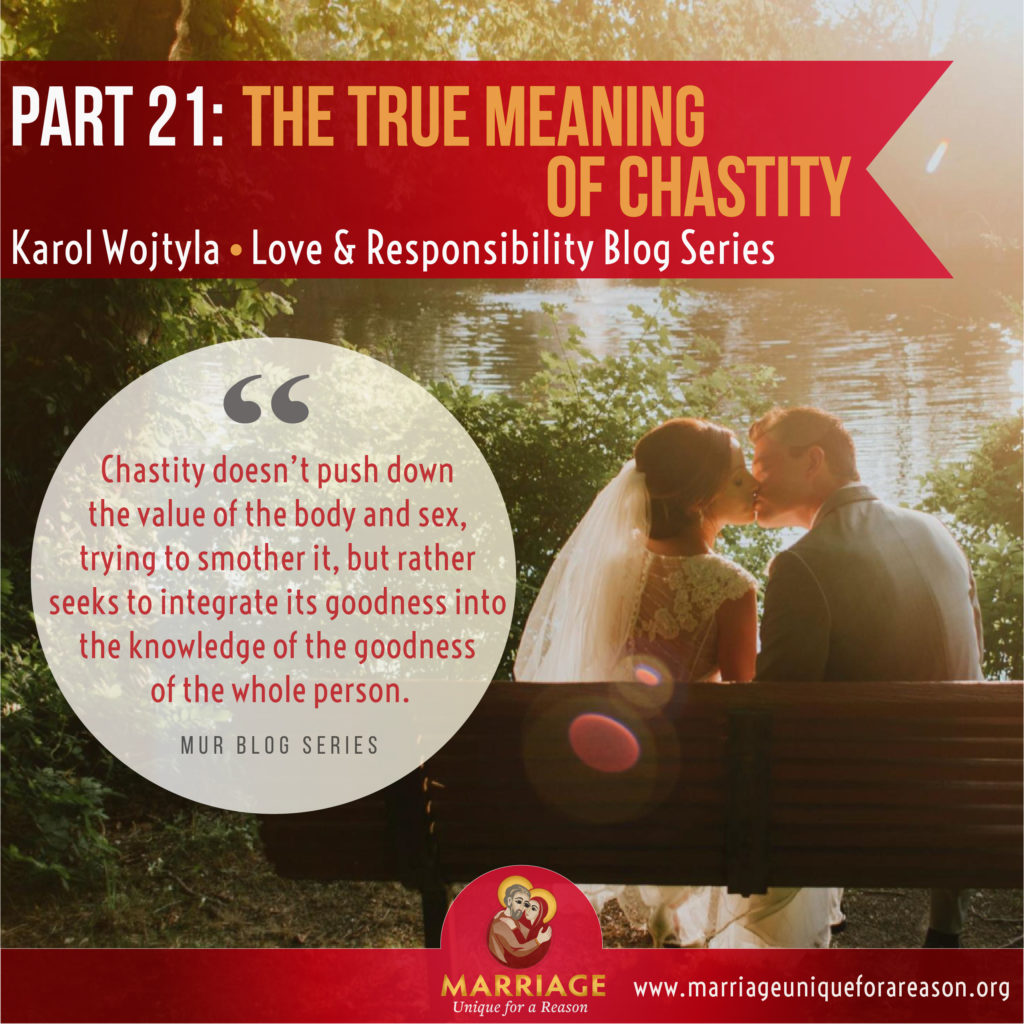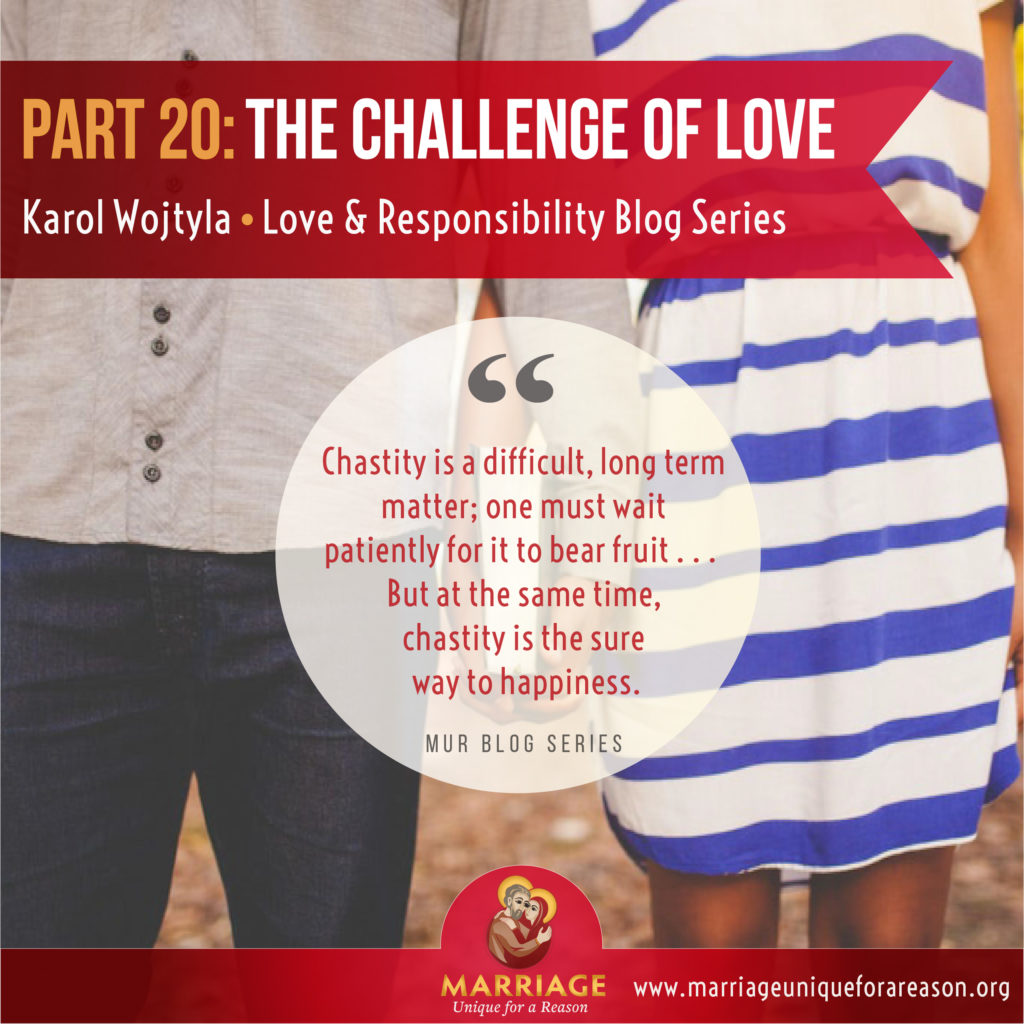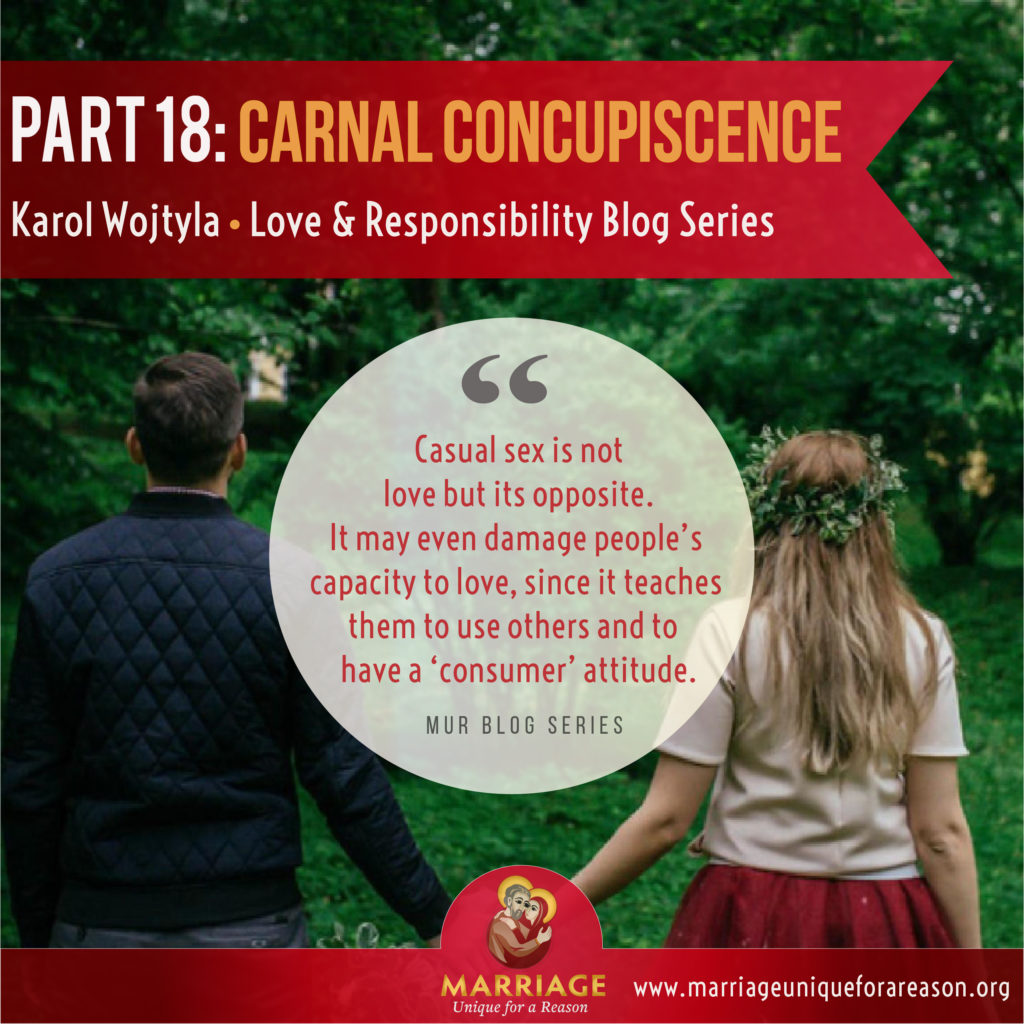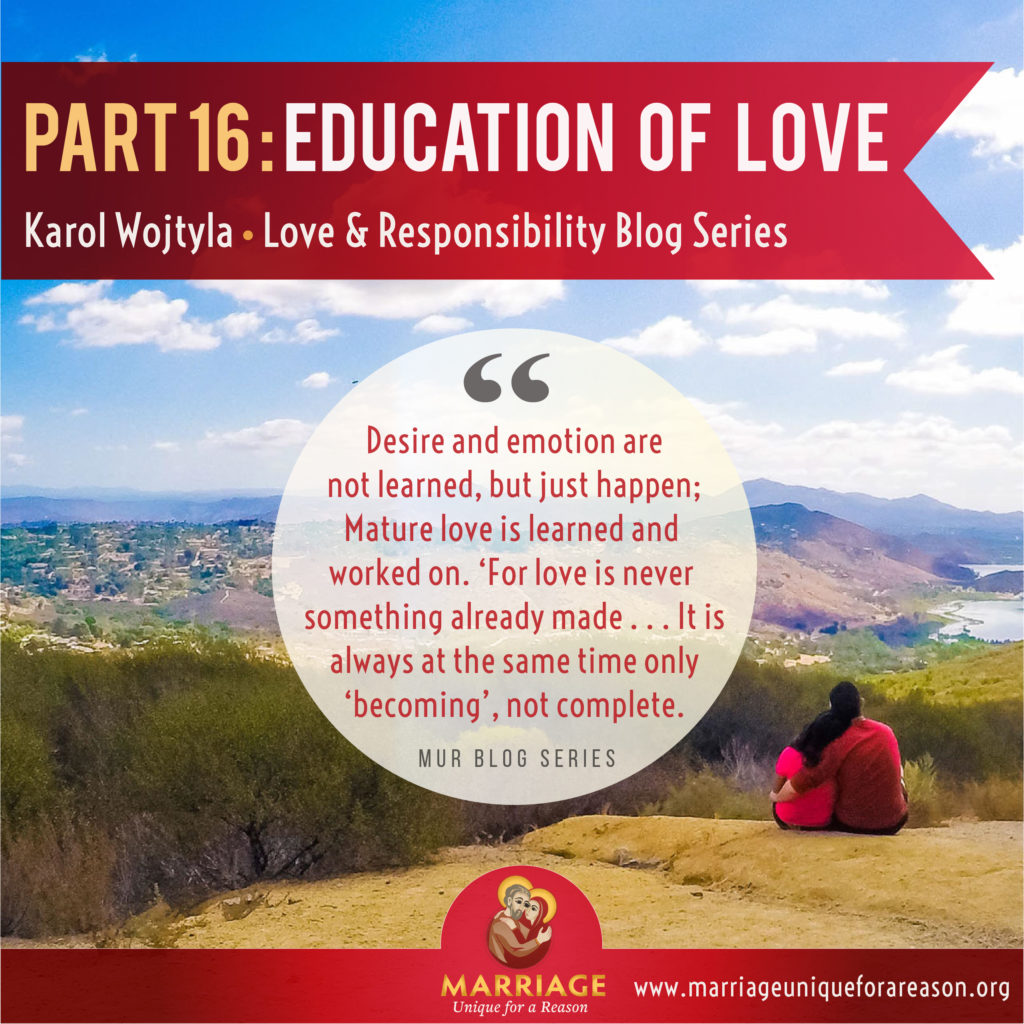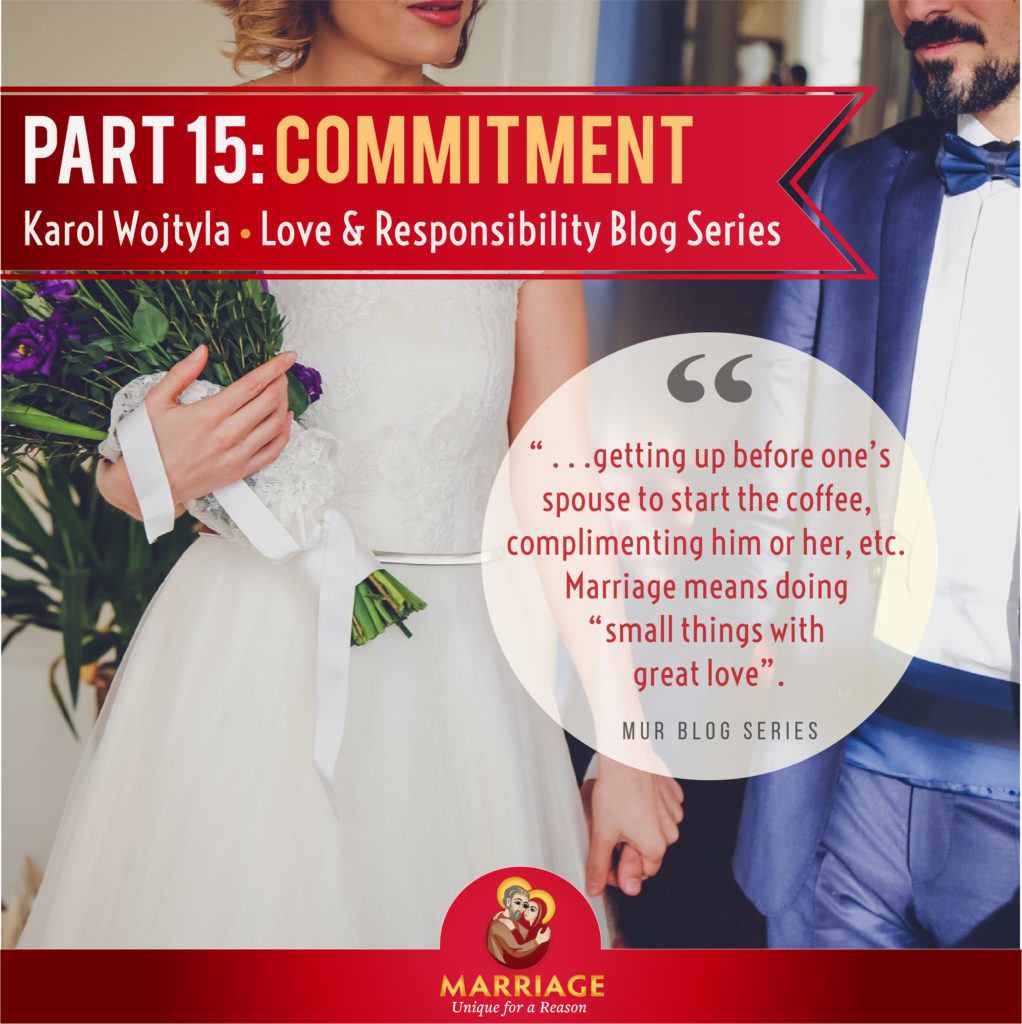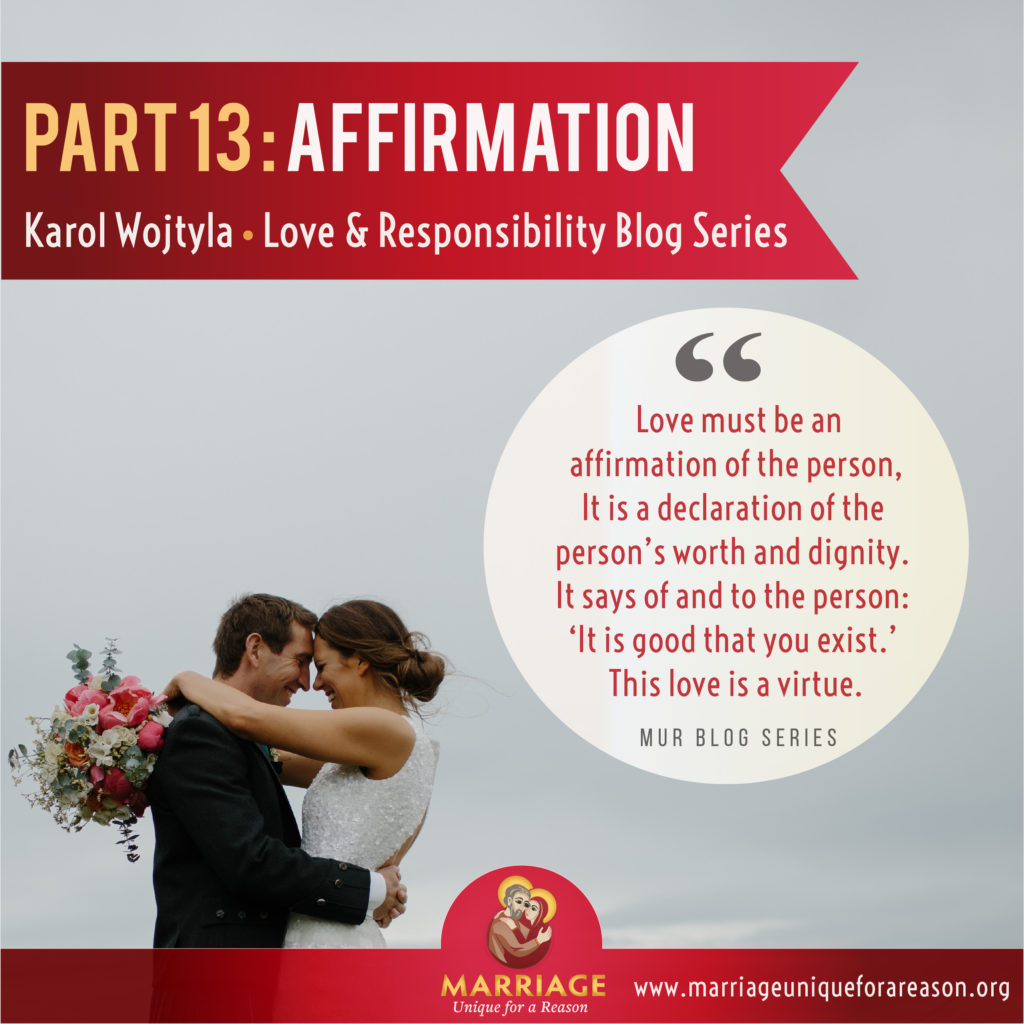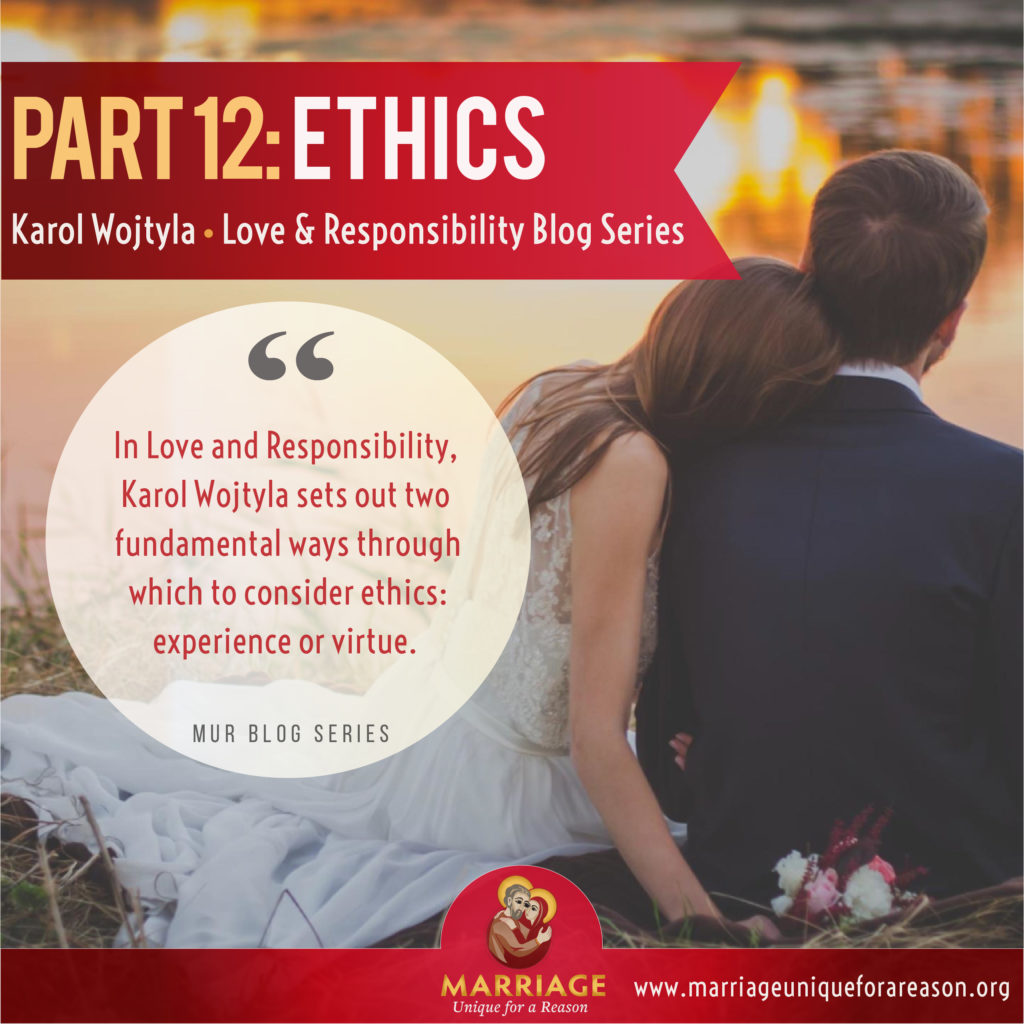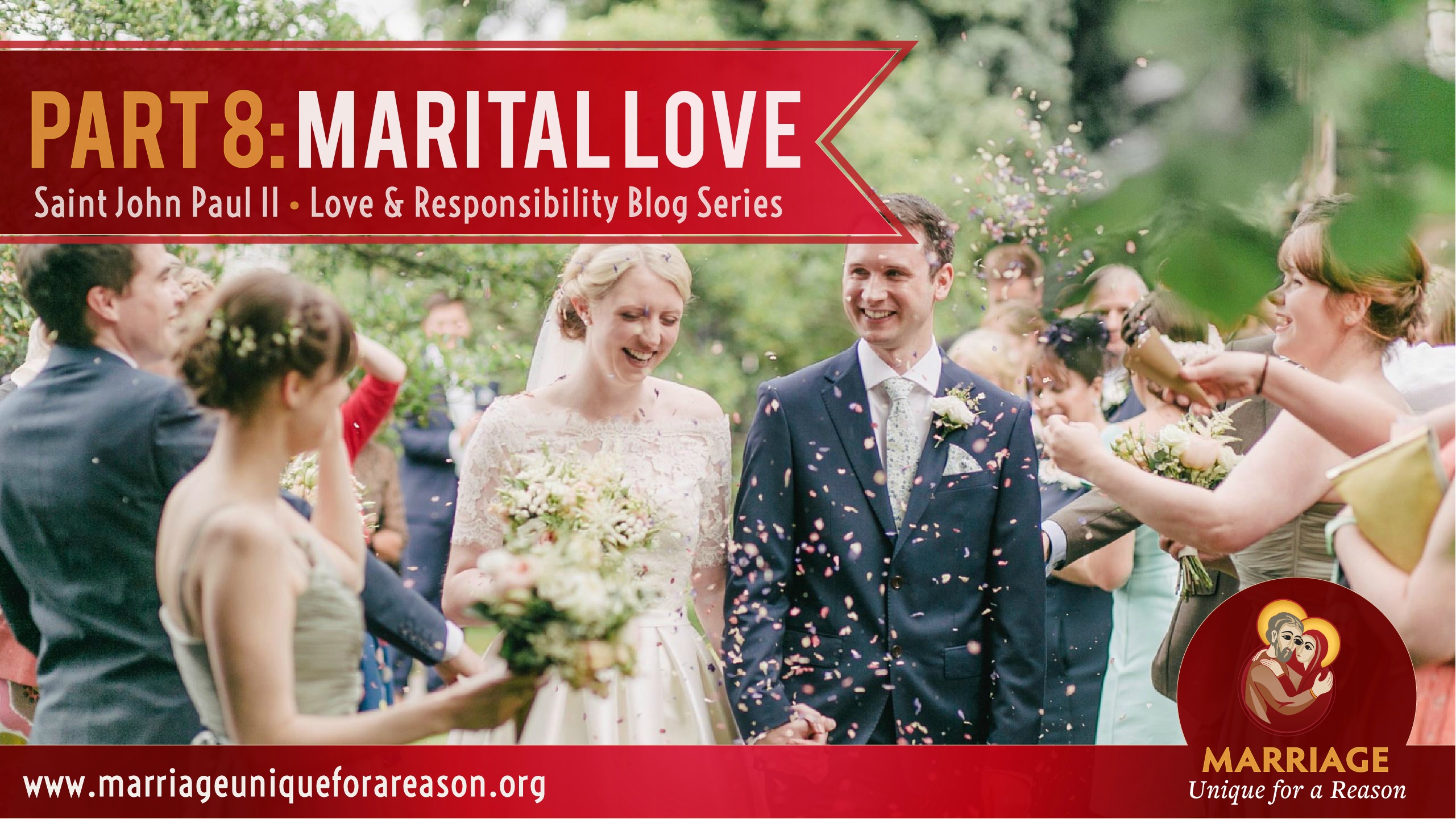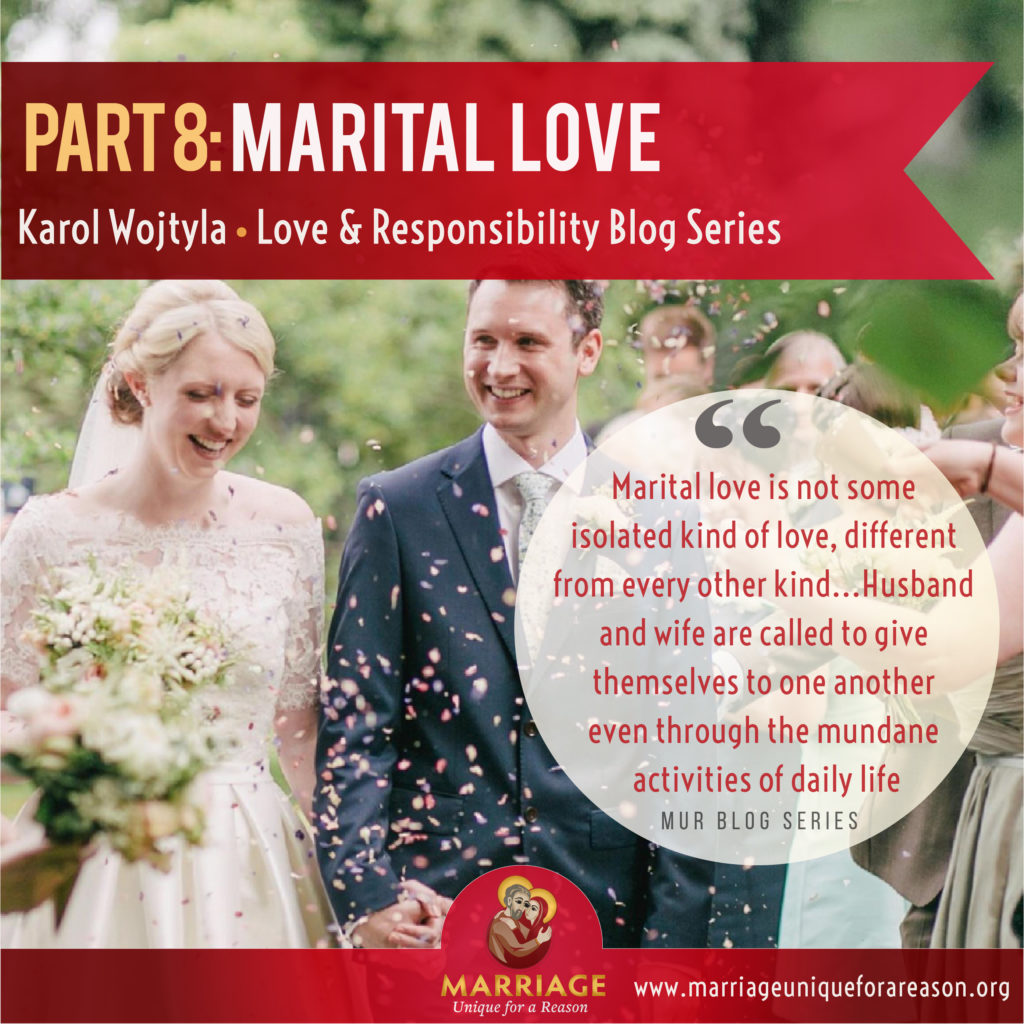Made for Love Ep 41: The Four Temperaments
Do you know the four temperaments? Which one are you? Today we focus on the temperaments and marriage. Some temperament matches are going to be “easier” than others, but no matter what temperaments you and your spouse have, you can still help each other get to heaven! This episode features Art and Laraine Bennett, the authors of The Temperament God Gave You (and others), Nick and Lucy van Schaijik, and Brady and Sarah Wilson.
Listen on Podbean:
Or Soundcloud:
Archive
Made for Love Ep 32: The Love Languages
Happy National Marriage Week!!!! (Feb 7-14) Check out For Your Marriage for lots of events and special posts for this week.
Described in a popular book by Gary Chapman, the five love languages are five different ways that we human beings give and receive love; and some of them “speak” to us better than others. The thing is, we don’t even necessarily realize it, or how to talk about it. Today on Made for Love we’re talking about the five love languages in marriage with Francis and Julia Dezelski, Bryan and Liz Smalley, and Craig and Stephanie Rapp.
On Podbean:
And Soundcloud:
Archive
Made for Love Ep 25: Catholics and Pornography
“Porn Kills Love.” This slogan from “Fight the New Drug” resonates with Catholic teaching about pornography. This episode is about Catholics dealing with addiction to pornography. It includes DJ Hueneman, Jeff and Annette Kohn, Kevin and Krista Burridge, Patty Breen, and Perry West.
Soundcloud:
Or Podbean:
The 2005 USCCB statement “Create in Me a Clean Heart” (Also in Spanish) addresses the crisis of pornography in today’s world. There’s an abridged version if you are pressed for time! The conference also publishes pamphlets to help particular groups:
- For Married Couples
- On Raising Children
- For Priests
- For Those Struggling with Addiction
The USCCB’s For Your Marriage website also has resources and help for people dealing with pornography.
The journal Humanum has a beautiful witness story: The Cleansing of the Temple: Casting Pornography Out of Marriage
Archive
Made for Love Episode 20: Families who Love Members with Down Syndrome
Down Syndrome is a part of many Catholic families’ stories. Children with Down Syndrome bring immense joy into their families, even as their intellectual disabilities and medical problems may bring crosses and hardships. Today we’ll hear from Archbishop Kurtz (Louisville), a family who have children with Down Syndrome (J.D. and Kate Flynn), a UK filmmaker (Randal Wright), and a reporter from Aleteia (Zoe Romanowsky).
And here’s a link to the story that Zoe talks about on the podcast: https://aleteia.org/2018/03/19/50-moms-join-in-car-pool-karaoke-with-their-kids-to-shed-light-on-down-syndrome-video/
On Podbean:
And Soundcloud:
Archive
Made for Love Ep 16: Humanae Vitae 50 Years Later: Part 2
On today’s Made for Love, we continue to look at Humanae Vitae fifty years later. What is the Church’s teaching on the “transmission of life”? This episode features Chris and Becky Wilson, Sister Helena Burns, fsp, Chris Reynolds from the Couple to Couple League, Dr. John Grabowski of CUA, and Dr. Theresa Notare of the USCCB’s NFP office.
Here are the Resolutions of the Lambeth Conference of 1930.
Archive
When Love is Not Love: Made for Love Ep. 3 Show Notes
Stacy and Nabil met in college. Their wedding day was the happiest day of Stacy’s life. But within a few years, they were divorced and Stacy was petitioning for an annulment. What happened? This episode explores the complex issue of annulment in the Catholic Church and features Stacy Thomlison, Fr. Bob Cannon of the Archdiocese of the Military Services, and Alice Heinzen, the marriage and family life director from the Diocese of La Crosse.
To learn more about the annulment process, speak to a priest at your local parish or call the marriage and family life director for your diocese. They will be able to listen to your story and help guide you.
To read up on Catholic teaching on annulments, head here for some FAQ’s: http://www.foryourmarriage.org/catholic-marriage/church-teachings/annulments/
There are links on the bottom of the article to Vatican documents about the annulment process, including the most recent revision that Pope Francis instituted. And here’s the USCCB webpage all about annulments.
Stacy is part of the Fellowship of Catholic University Students, which is an effective evangelization ministry. I saw her give a talk to the National Council of Catholic Women, which was founded by the U.S. Bishops in 1920.
Here’s a story about Fr. Bob Cannon that gives more of his background (and a picture!) http://www.milarch.org/father-robert-r-cannon-ch-col-usaf-named-ams-chancellor/
Here are some articles that Alice Heinzen has written that you may be interested in: https://www.catholicmatch.com/institute/author/aheinzen/
Alice and her husband Jeff were able to speak to the bishops assembled in Rome for the Extraordinary Synod on the Family in 2014. Read their testimony here: https://zenit.org/articles/synod14-testimony-of-mr-and-mrs-jeffrey-heinzen-diocese-of-la-crosse-usa/
Archive
When Love Meets Silence: Made for Love Ep. 2 Show Notes
Terri and Vince met later in life and married with a vision of years of companionship ahead. This vision lasted only one month, when Vince started showing signs of an illness that there was no name for. Terri took care of Vince until he died seventeen years later, showing fidelity to her promises in a beautiful way. This episode includes Bishop Frank Caggiano, of the Diocese of Bridgeport, Fr. Scott Sina of the Diocese of Arlington, and Robert Mastrogiavanni, the President of the Well Spouse Association.
Terri has written a number of articles about her experience with caregiving. Here’s one with some pictures of her and Vince:
“I Married the Love of My Life—Then Immediately Became His Caregiver for 16 Years”
by Terri Corcoran as told to Abigail Cuffey, August 7, 2017
Women’s Day
And another with more details about Vince’s illness:
Life with FXTAS: Supporting a Spouse with Fragile X-Associated Tremor Ataxia Syndrome
Here’s a link to the Well Spouse Association: http://www.wellspouse.org/
[Please note that this is not an endorsement of the organization.]
Archive
The True Meaning of Chastity: Love and Responsibility (Post #21)
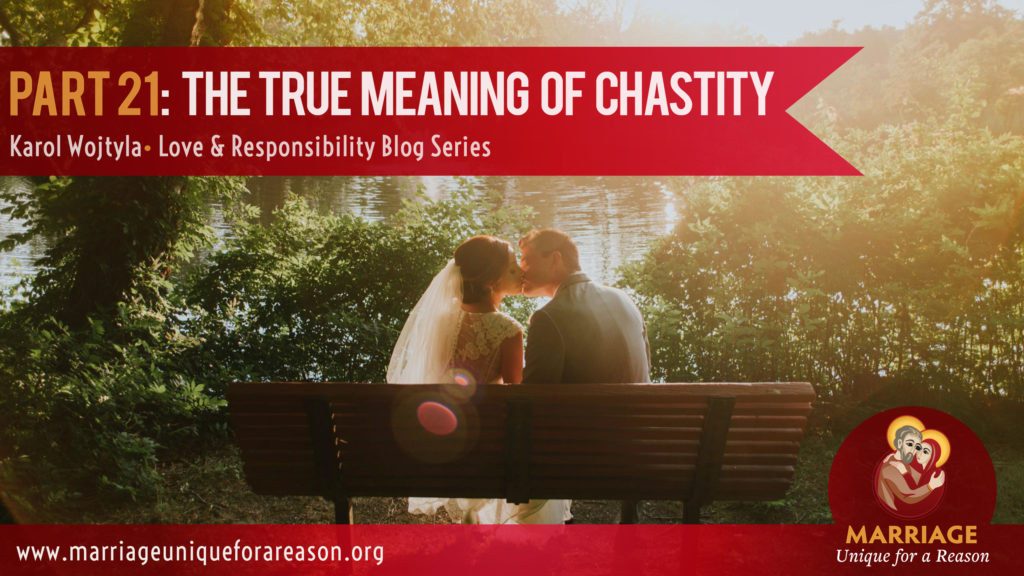 Note bene: This blog post includes a quote from the newer translation by Grzegorz Ignatik of Love and Responsibility—this translation is more readable and may be in some ways more faithful to the original, but the blog post author is most familiar with the H.T. Willets translation and that is why it has been used more!
Note bene: This blog post includes a quote from the newer translation by Grzegorz Ignatik of Love and Responsibility—this translation is more readable and may be in some ways more faithful to the original, but the blog post author is most familiar with the H.T. Willets translation and that is why it has been used more!
Chastity as Virtue:
Where does chastity fit in the general pursuit of virtue? This is what Wojtyla seeks to answer in this section of Love and Responsibility. Aquinas places chastity under the cardinal virtue of temperance[1], or moderation, by which reason moderates physical drives (for food, drink, and 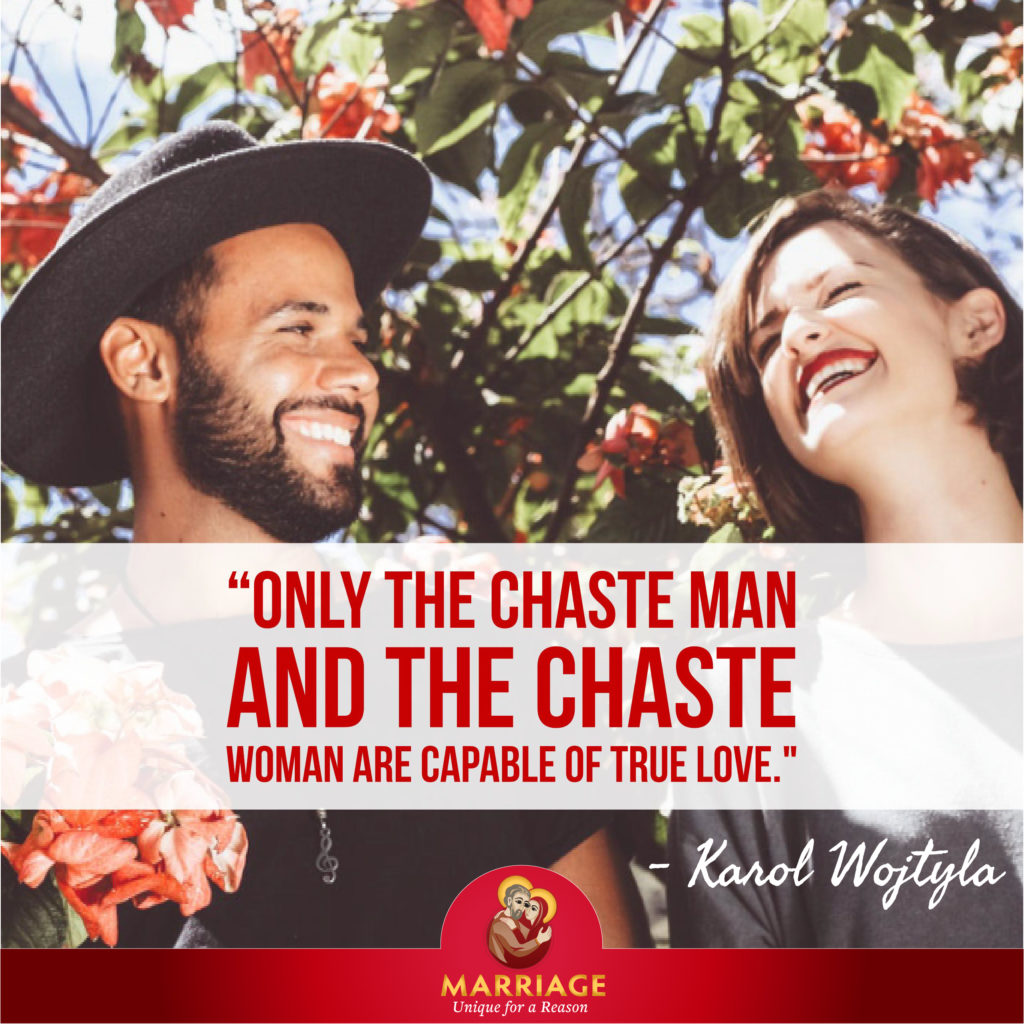 sex). Thus for Aquinas, chastity, as a sub-virtue of moderation, is having control over one’s sensual desire, such that the person is in a more or less permanent state of control (in the will).
sex). Thus for Aquinas, chastity, as a sub-virtue of moderation, is having control over one’s sensual desire, such that the person is in a more or less permanent state of control (in the will).
Wojtyla asks, is that really the best way to think about chastity? As self-control? No, he argues, “There is no way to comprehend chastity without the virtue of love.”[i] The virtue of chastity cannot only consist in control over one’s impulses, but rather control of “those centres deep within the human being in which the utilitarian attitude is hatched and grows.”[ii] This is much harder, and much easier, than acquiring chastity as moderation. It’s harder because looking at yourself honestly and working to root out self-centeredness and a tendency to use others is the work of a lifetime. And yet, once you engage in this deeper work you are much less likely to fall into particular sins related to lust or emotional manipulation. A virtue makes doing what is right easy and joyful. It becomes “co-natural” and it is no longer a real question or temptation because the will is solidly grounded in the understanding of the value of the person.
Consider pornography, for example. There will always be external temptations to view pornography, but the man or woman who has internalized and gained the virtue of chastity does not experience these temptations in the same way that 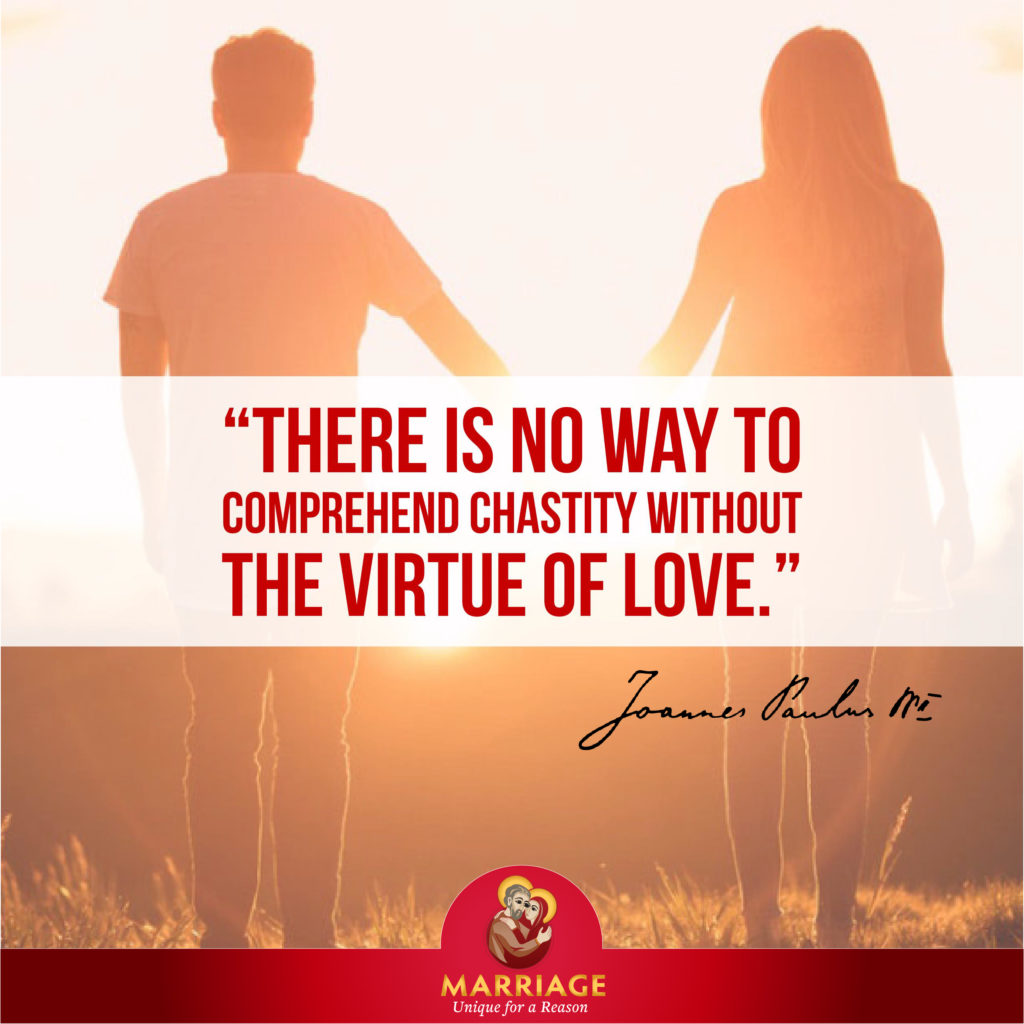 someone who does not have the virtue does. He or she knows in their mind that pornography degrades a human being, and has chosen with his or her will, over and over again, to reject it, such that pornography loses much of its power.[2]
someone who does not have the virtue does. He or she knows in their mind that pornography degrades a human being, and has chosen with his or her will, over and over again, to reject it, such that pornography loses much of its power.[2]
The Goodness of the Whole Person:
“To be chaste,” Wojtyla writes, “means to have a ‘transparent’ attitude to a person of the other sex… the desire to ‘enjoy’ is subordinated to a readiness to show loving kindness in every situation.”[iii] Wojtyla reiterates that chastity does not mean “artificially banishing the values of the ‘body’ or more generally the values of sex to the subconscious, of pretending that they do not exist or at any rate have no effect.”[iv] That is not a good idea. As Wojtyla notes, this false idea of chastity lends itself to “explosions” of sexual desire after repression.[v] Such repression happens when one sees chastity only as a negative virtue (a “no”), “whereas it is above all the ‘yes’ of which certain ‘no’s’ are the consequence.”[vi] Chastity’s essence is 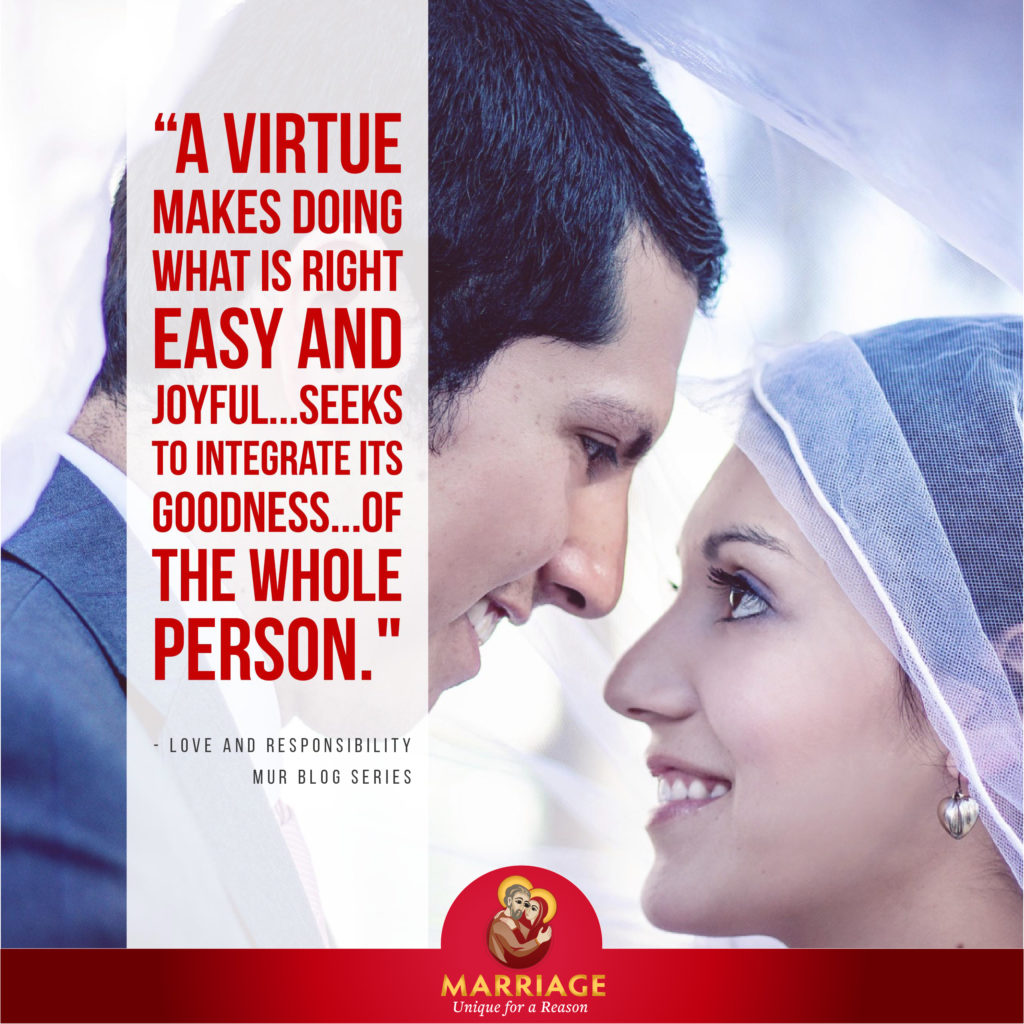 “quickness to affirm the value of the person in every situation and in raising to the personal level all reactions to the value of ‘the body and sex.’”[vii] It doesn’t push down the value of the body and sex, trying to smother it, but rather seeks to integrate its goodness into the knowledge of the goodness of the whole person. As Wendy Shalit wrote about modesty (a sub-virtue of chastity) in A Return to Modesty:
“quickness to affirm the value of the person in every situation and in raising to the personal level all reactions to the value of ‘the body and sex.’”[vii] It doesn’t push down the value of the body and sex, trying to smother it, but rather seeks to integrate its goodness into the knowledge of the goodness of the whole person. As Wendy Shalit wrote about modesty (a sub-virtue of chastity) in A Return to Modesty:
“Whether she decides to have scores of men or none, promiscuous
and prudish women in some sense embrace the same flippant world view,
which one might call the nothing-fazes-me world view. As types, they rep-
resent two sides of the same unerotic coin, which flips over arrogantly and
announces to the world when it lands, “Ha!—I cannot be moved.” Modesty
is prudery’s true opposite, because it admits that one can be moved and
issues a specific invitation for one man to try.”[viii]
If sexual reactions were always bad or undesirable, how could marriage be considered good or holy? “True chastity does not lead to disdain for the body or to disparagement of matrimony and the sexual life,”[ix] Wojytla writes. “That is the result of false chastity, chastity with a tinge of hypocrisy, or, still more frequently, of unchastity.”[x] A person who has not integrated their sexual reactions into a deeper affirmation of the person will see all sexual reactions as ‘dirty.’ “Thus only the chaste man and the chaste woman are capable of true love.”[xi] Chastity frees a couple from using each other and gives them the ability to love in their marital 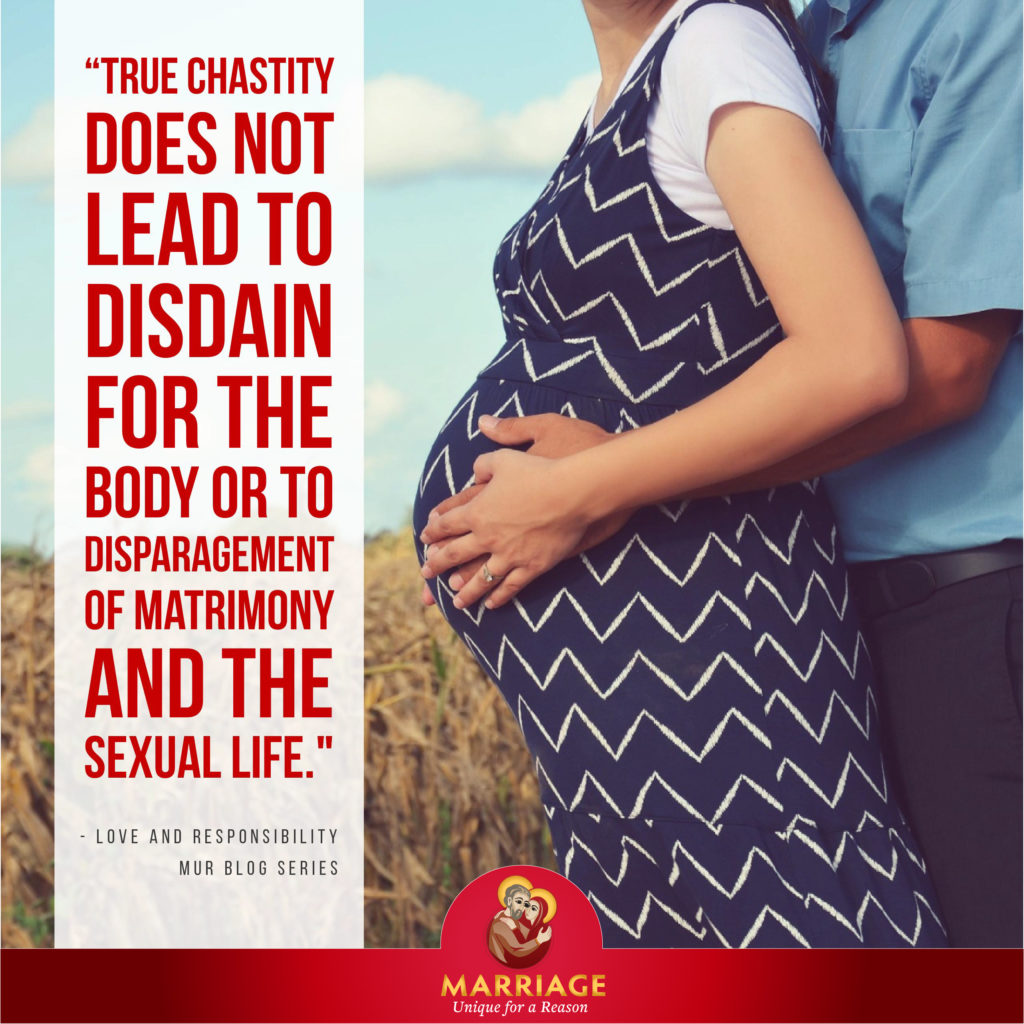 sexual relationship.[xii] This requires maturity of many kinds, since concupiscence remains. “For this reason, chastity is a difficult, long term matter; one must wait patiently for it to bear fruit.”[xiii]
sexual relationship.[xii] This requires maturity of many kinds, since concupiscence remains. “For this reason, chastity is a difficult, long term matter; one must wait patiently for it to bear fruit.”[xiii]
Finally, Wojytla writes about the “humility of the body,” which he asserts is necessary for love.[xiv] “The human body must ‘humble itself’ in face of the magnitude represented by love… subordinate itself [to love].”[xv] Instead of the person striving to satisfy the body’s desires, the chaste person basically says to the body, “Not so fast! This is a person, and he/she is a child of God, destined for heaven.” Thus the body is subordinated to the ultimate happiness of the person. For, “Blessed are the pure in heart, for they shall see God” (Mt. 5:8).
[1] If you need a little refresher, the cardinal virtues are the four “big” virtues, under which other virtues fall. They are prudence, temperance, justice, and fortitude.
[2] This is one of the reasons that early exposure to pornography is so harmful to the person—it snatches away, if you will, the innocent period of time when a child sees everyone as a human person first and only later as a sexual body, and makes it that much harder to develop chastity and a proper view of the human person.
[i] Karol Wojtyla. Love and Responsibility (Boston: Pauline Books and Media, 2013), p. 154.
[ii] Wojtyla, Karol. Love and Responsibility (San Francisco: Ignatius Press, 1993), p. 170.
[iii] Ibid, p. 170.
[iv] Ibid, p. 170.
[v] Ibid, p. 170.
[vi] Ibid, p. 170.
[vii] Ibid, p. 171.
[viii] Wendy Shalit. A Return to Modesty (New York: Touchstone, 1999), p. 182.
[ix] Ibid, p. 171.
[x] Ibid, p. 171.
[xi] Ibid, p. 171.
[xii] Ibid, p. 171.
[xiii] Ibid, p. 172.
[xiv] Ibid, p. 172.
[xv] Ibid, p. 172.
Archive
The Challenge of Love: Love and Responsibility Series (Post #20)
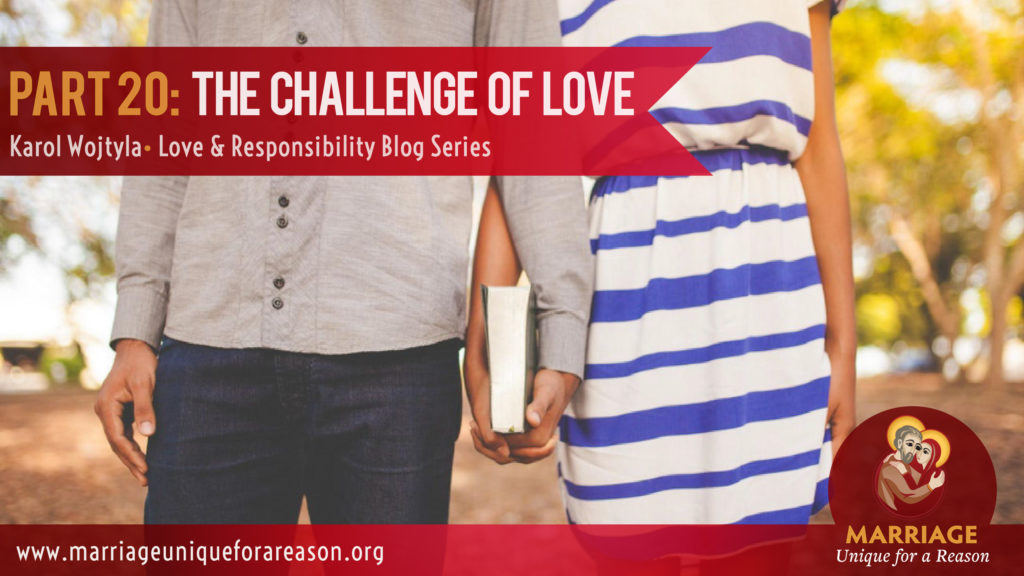 Integration of Love:
Integration of Love:
In this section of Love and Responsibility, Wojtyla analyzes what concupiscence is and what it’s not. It’s not a sin, but it is a challenge to the growth of mature love between a man and a woman. “Concupiscence is a consistent tendency to see persons of the other sex through the prism of sexuality alone, as ‘objects of potential enjoyment.’”[1] 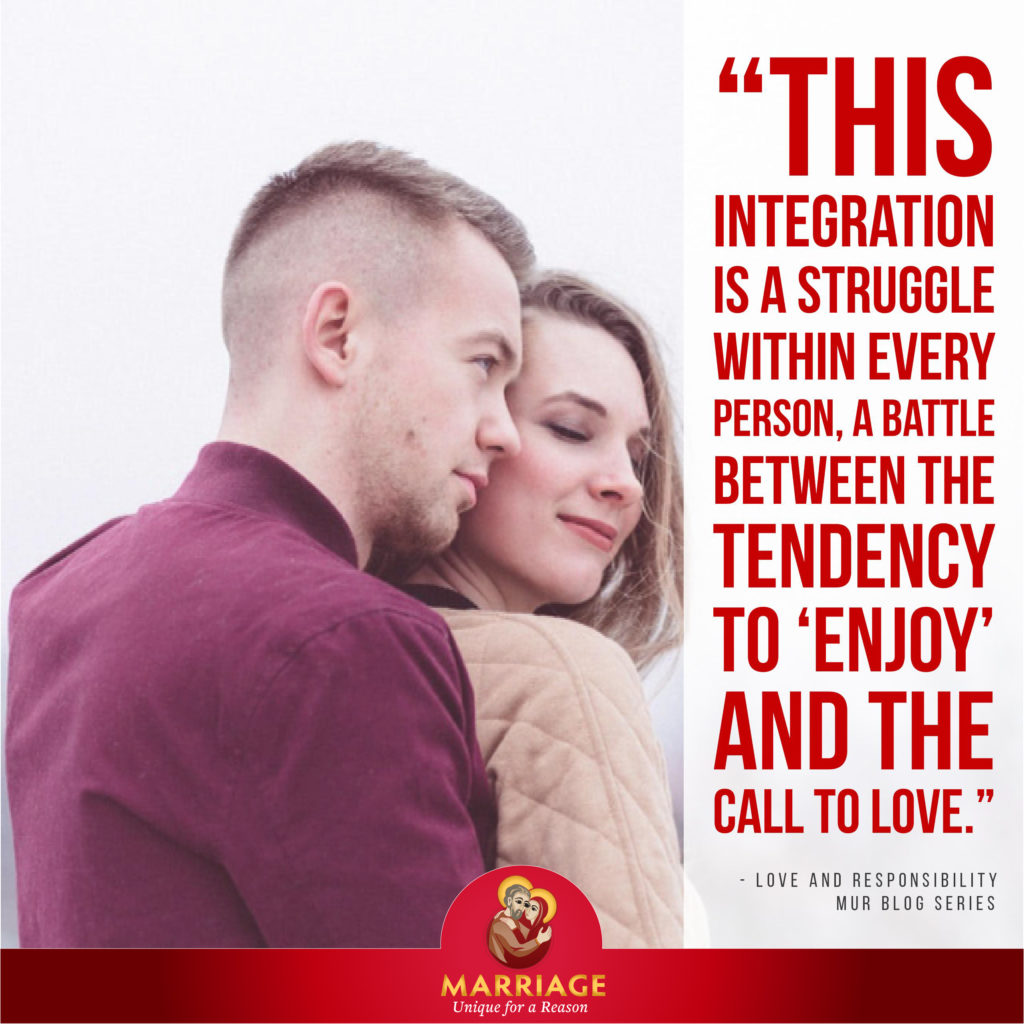 Wojtyla points out that overcoming this tendency does not mean becoming “a-sexual” or “blind to the value of ‘the body and sex,’” but rather that it is integrated into love of the person, the whole person, which includes his or her body.[2] (There’s a sweet song about this kind of integration called “You Wouldn’t Mind” by Colleen Nixon.)
Wojtyla points out that overcoming this tendency does not mean becoming “a-sexual” or “blind to the value of ‘the body and sex,’” but rather that it is integrated into love of the person, the whole person, which includes his or her body.[2] (There’s a sweet song about this kind of integration called “You Wouldn’t Mind” by Colleen Nixon.)
Wojtyla writes that this integration is a struggle within every person, a battle between the tendency to “enjoy” and the call to love. He emphasizes again that concupiscence is only the “germ of sin,” not sin itself, since it is not a choice.[3] Our reactions toward one another are “muddied” because of original sin, so that “it is not altogether safe to put one’s trust in the reactions of the senses” or emotions.[4] That is hard! We want to just relax and go with our desires and feelings, but that’s not always a good plan.
Concupiscence vs. Lust:
Wojtyla points out that because of original sin, human beings tend to desire others sexually even if they don’t “love” them at all—concupiscence pushes people in that direction. Therefore, for concupiscence to become lust, “passive acquiescence suffices.”[5] In other words, if one does not actively guard against lust (the sin), one will most likely lose the battle. Concupiscence will win. At the same time, one shouldn’t mistake concupiscence for the sin of lust. It’s the will that determines whether we sin or not. “As soon as the will consents,” Wojtyla writes, the desire becomes something that the person is “actively doing” rather than something that is “happening to” him or her.[6]
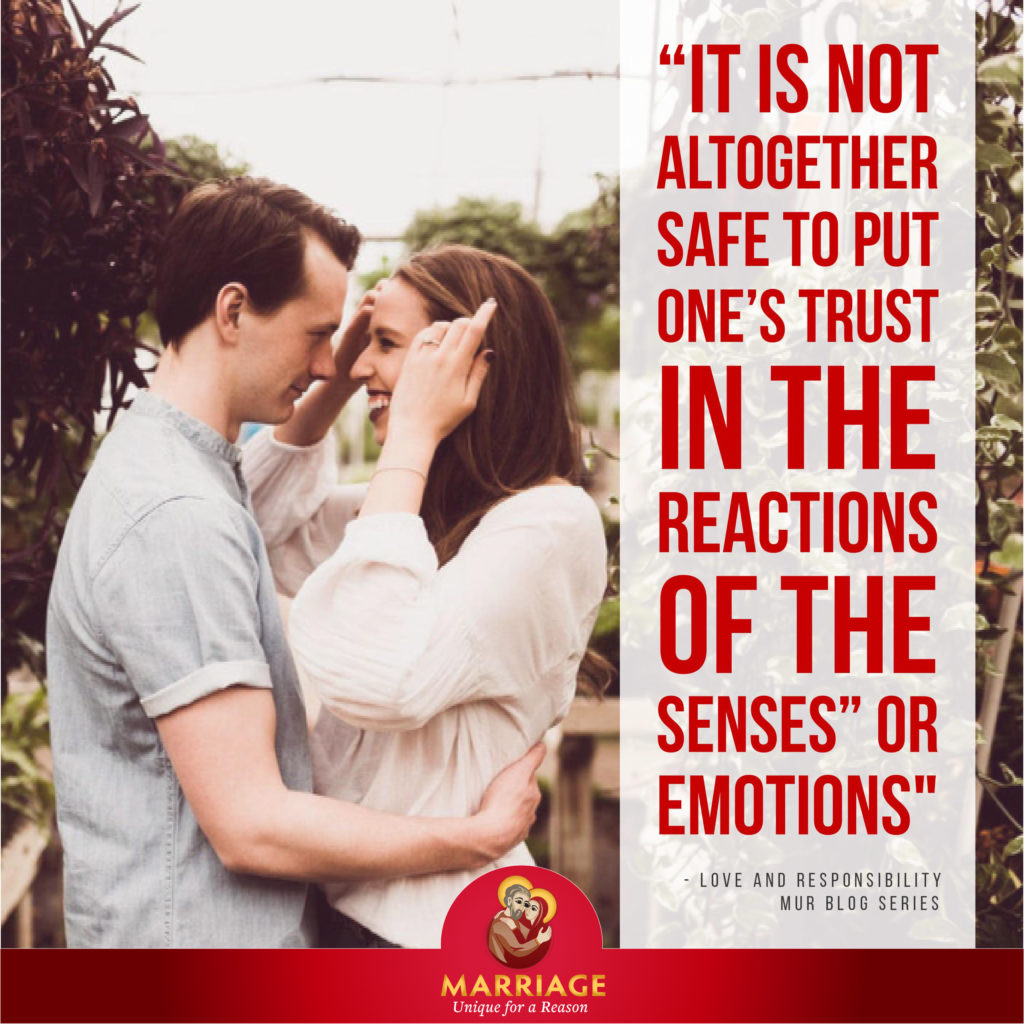 Some people (perhaps all!) have a hard time finding that boundary between what is just happening in them and what they are choosing. Wojtyla says that since concupiscence pushes the human being toward lust, the person may mistake this push for the choice. But just because a person feels something doesn’t mean they will or choose it. In fact, “an act of the will directed against a sensual impulse does not generally produce any immediate result… [the sexual reaction] generally runs its full course even if it meets emphatic opposition in the sphere of the will.”[7] If you didn’t choose it, it’s not a sin.
Some people (perhaps all!) have a hard time finding that boundary between what is just happening in them and what they are choosing. Wojtyla says that since concupiscence pushes the human being toward lust, the person may mistake this push for the choice. But just because a person feels something doesn’t mean they will or choose it. In fact, “an act of the will directed against a sensual impulse does not generally produce any immediate result… [the sexual reaction] generally runs its full course even if it meets emphatic opposition in the sphere of the will.”[7] If you didn’t choose it, it’s not a sin.
So far in this section, Wojtyla has been focused on sensual reactions, but now he turns to emotions. He reiterates that love cannot be reduced to emotion and that sin comes when “the will puts emotion before the person.”[8] He notes that, “Authenticity of feeling is quite often inimical to truth in behavior.”[9] In the footnote to this statement, Wojtyla notes that one should treat one’s feelings, “with a certain distrust,” noting that often, someone’s being “true to their feelings” is used to justify bad actions, like leaving one’s spouse for another.[10] “The particular danger of ‘sinful love’ [lust] consists in a fiction: immediately, and before reflection, it is not felt to be ‘sinful,’ but is, above all, felt to be love… it makes the sin more dangerous.”[11]
Lust is dangerous because it is not experienced as what it is: wrong, a sin. The persons justify it by a false idea of love as emotion. Instead, the will must “demand of reason a correct vision of love and of the happiness which love can bring to a woman and a man.”[12] It is the will that guards the person against a “sinful love” and if the will guards one person, it simultaneously protects the other.
[1] Wojtyla, Karol. Love and Responsibility (San Francisco: Ignatius Press, 1993), p. 159.
[2] Ibid, p. 159.
[3] Ibid, p. 160.
[4] Ibid, p. 161.
[5] Ibid, p. 161.
[6] Ibid, p. 162.
[7] Ibid, p. 162.
[8] Ibid, p. 163.
[9] Ibid, p. 163.
[10] Ibid, p. 302.
[11] Ibid, p. 165.
[12] Ibid, p. 166.
Archive
Carnal Concupiscence: Love and Responsibility Series (Post #18)
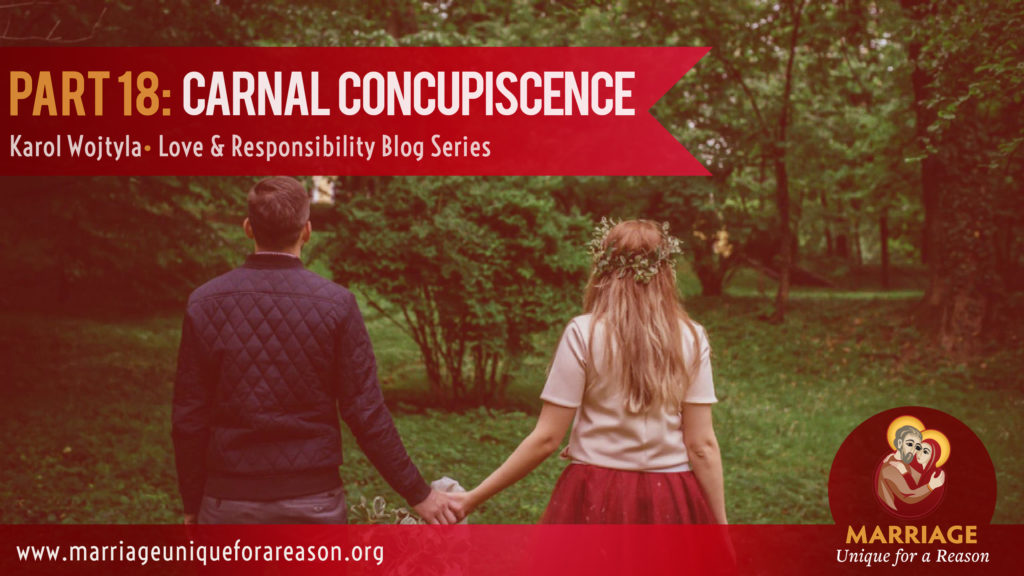
What is Carnal Concupiscence?
Wojtyla begins this section on carnal concupiscence (Definition: the tendency toward sin in the area of sexuality) in Love and Responsibility by noting that, in the relationship between man and woman, the subject of an action is a person of one sex and the object is the other sex, and “only love blurs this relationship,”[i]—i.e. the two persons see each other as “another self,” and therefore not a totally separate individuals. Even if the two persons really do feel like a “we,” a joint, single subject, “This feeling, however, does nothing to alter the objective fact that they are in reality two different 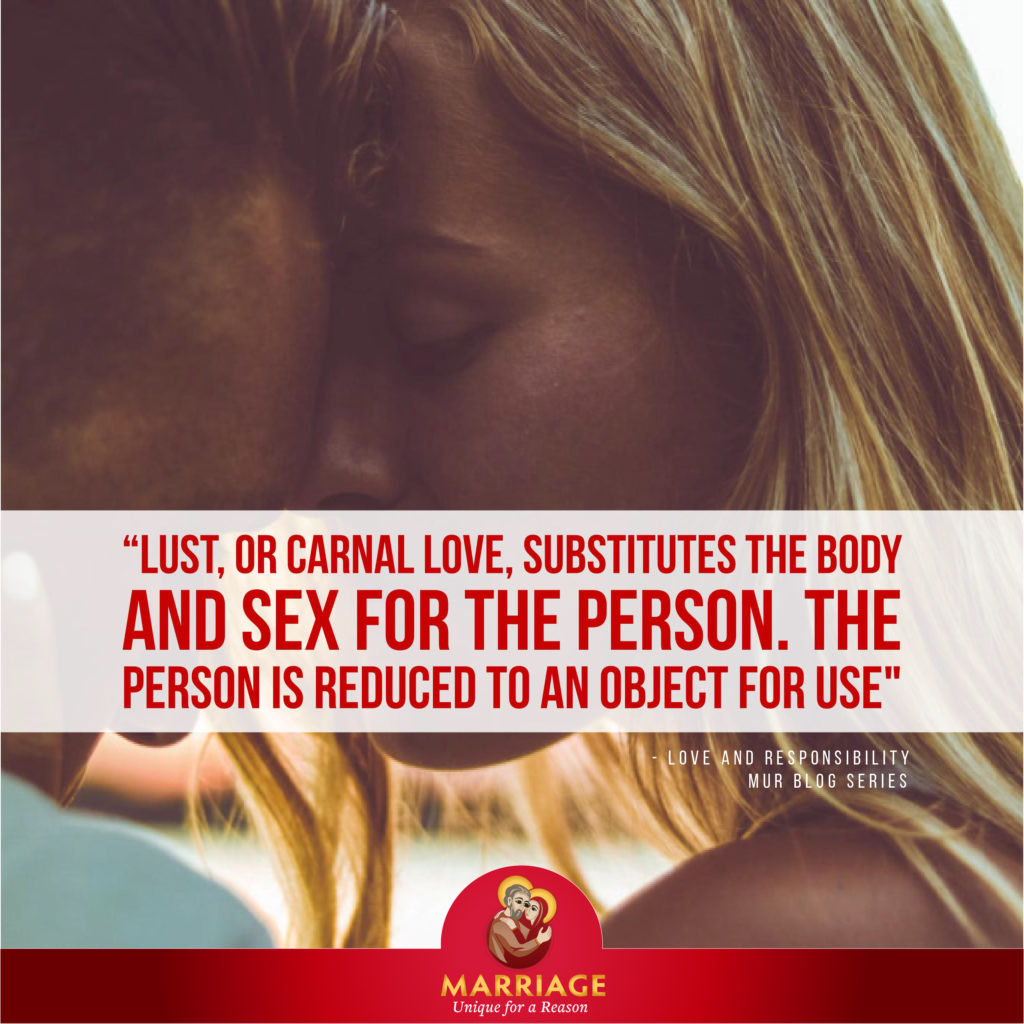 beings and two different subjects of action,”[ii] Wojtyla writes. Often the actions of each person affect the other in a way that is more intense than in friendship or other more casual relationships. Wojtyla uses the word “actions” here to include thoughts and feelings which are “internal actions” only known to the person him- or herself.
beings and two different subjects of action,”[ii] Wojtyla writes. Often the actions of each person affect the other in a way that is more intense than in friendship or other more casual relationships. Wojtyla uses the word “actions” here to include thoughts and feelings which are “internal actions” only known to the person him- or herself.
Wojtyla turns to the Ten Commandments, pointing out that the two Commandments that have to do specifically with the relationship of the sexes cover both external actions (“Thou shalt not commit adultery”) and internal actions (“Thou shalt not covet thy neighbor’s wife”). In both cases, the object of the action is a person of the other sex. Carnal concupiscence, Wojtyla writes, is closely related to sensuality but it is not the same. Sensuality is the first reaction to a body of the other sex, as a possible “object of enjoyment,” but this reaction is not a sin. Concupiscence, like lust, is in the second movement—the movement of the will—to actively seek enjoyment out of the other person. The “obvious ease”[iii] by which a person moves from a reaction to this choice “is the source of great tensions in the inner life of the person,”[iv] Wojtyla writes.
Does Sex always = Love?
Sensuality easily turns into concupiscence or lust; the body’s reaction pushes the person in that direction. Wojtyla turns here to the famous philosopher and theologian St. Thomas Aquinas, who distinguishes these two movements of the soul as desire and the urge to act. Our feelings tend toward one or the other (thirst is an example of desire, anger of an urge to act). When sexual desire, focused solely on a body, is taken into the will and embraced, that is lust. The lustful person seeks bodily pleasure without regard to the 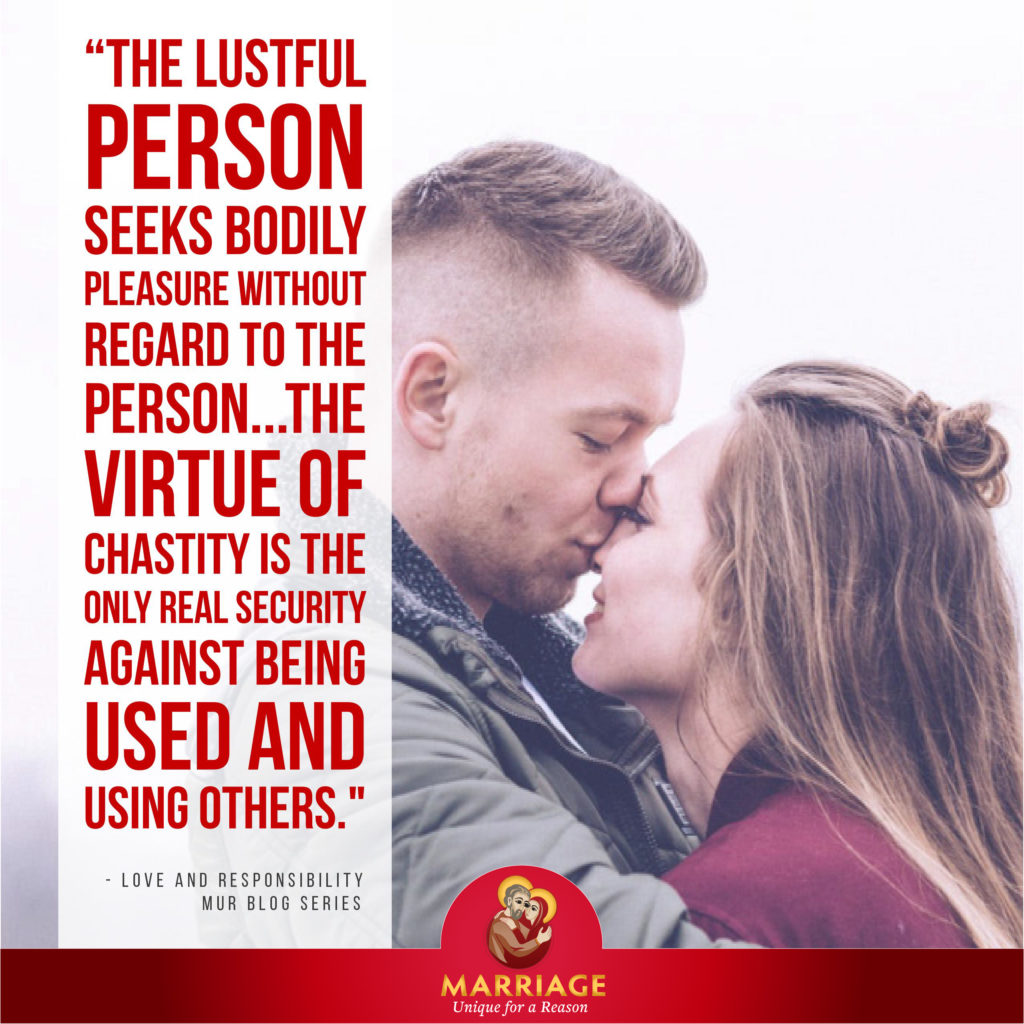 person. In such a case, as soon as this person achieves the bodily release that he or she craves, his or her attitude toward the other person changes completely. Consider one night stands as one clear way that this plays out in people’s lives. If Harry and Sally meet at a bar and “hook up,” it’s likely that Harry and Sally will look at each other very differently the next morning (or even just a short time later). “Sensuality is ‘expended’ in concupiscence,”[v] Wojtyla writes. If bodily desires are the only thing bringing two people together, and those desires are satisfied (at least temporarily) by the sexual act, then the two persons no longer have any reason to be together afterwards. This is normal in the animal world but a serious moral problem for human beings.
person. In such a case, as soon as this person achieves the bodily release that he or she craves, his or her attitude toward the other person changes completely. Consider one night stands as one clear way that this plays out in people’s lives. If Harry and Sally meet at a bar and “hook up,” it’s likely that Harry and Sally will look at each other very differently the next morning (or even just a short time later). “Sensuality is ‘expended’ in concupiscence,”[v] Wojtyla writes. If bodily desires are the only thing bringing two people together, and those desires are satisfied (at least temporarily) by the sexual act, then the two persons no longer have any reason to be together afterwards. This is normal in the animal world but a serious moral problem for human beings.
Lust, or carnal love, substitutes the body and sex for the person. The person is reduced to an object for use. The persons may feel love because of it— they may experience a powerful feeling of closeness and intimacy that comes from the release of hormones during sex—but this is a trick of nature. Lust drives people to have sex but it does not unite them as persons. Casual sex is not love but its opposite. It may even damage people’s capacity to love, since it teaches them to use others, to have a “consumer” attitude; to use and discard another human being.
Wojtyla notes that emotion (sentimentality) can act as one safeguard against carnal concupiscence or lust but it is not enough—the virtue of chastity is the only real security against being used and using others.
[i] Wojtyla, Karol. Love and Responsibility (San Francisco: Ignatius Press, 1993), p. 147.
[ii] Ibid, p. 147.
[iii] Ibid, p. 148.
[iv] Ibid, p. 148.
[v] Ibid, p. 149.
Archive
The Education of Love: Love and Responsibility Series (Post #16)
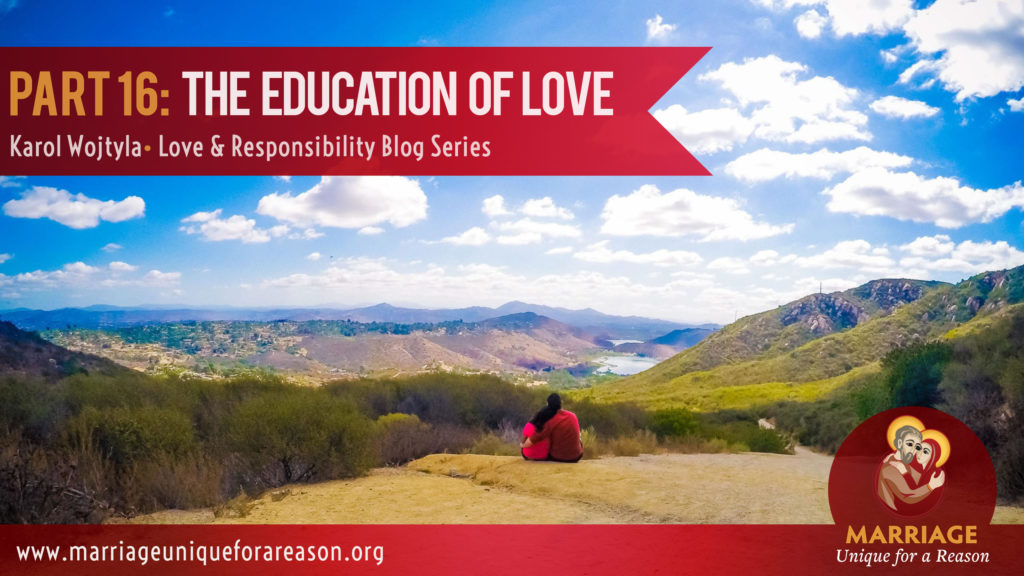
Mature Love is Learned:
Young people may scoff, Wojtyla notes in this section of Love and Responsibility, at the idea that love must be educated, or learned. But the love that a scoffer is are thinking of is the psychological aspect of love, its emotions and desires, not the 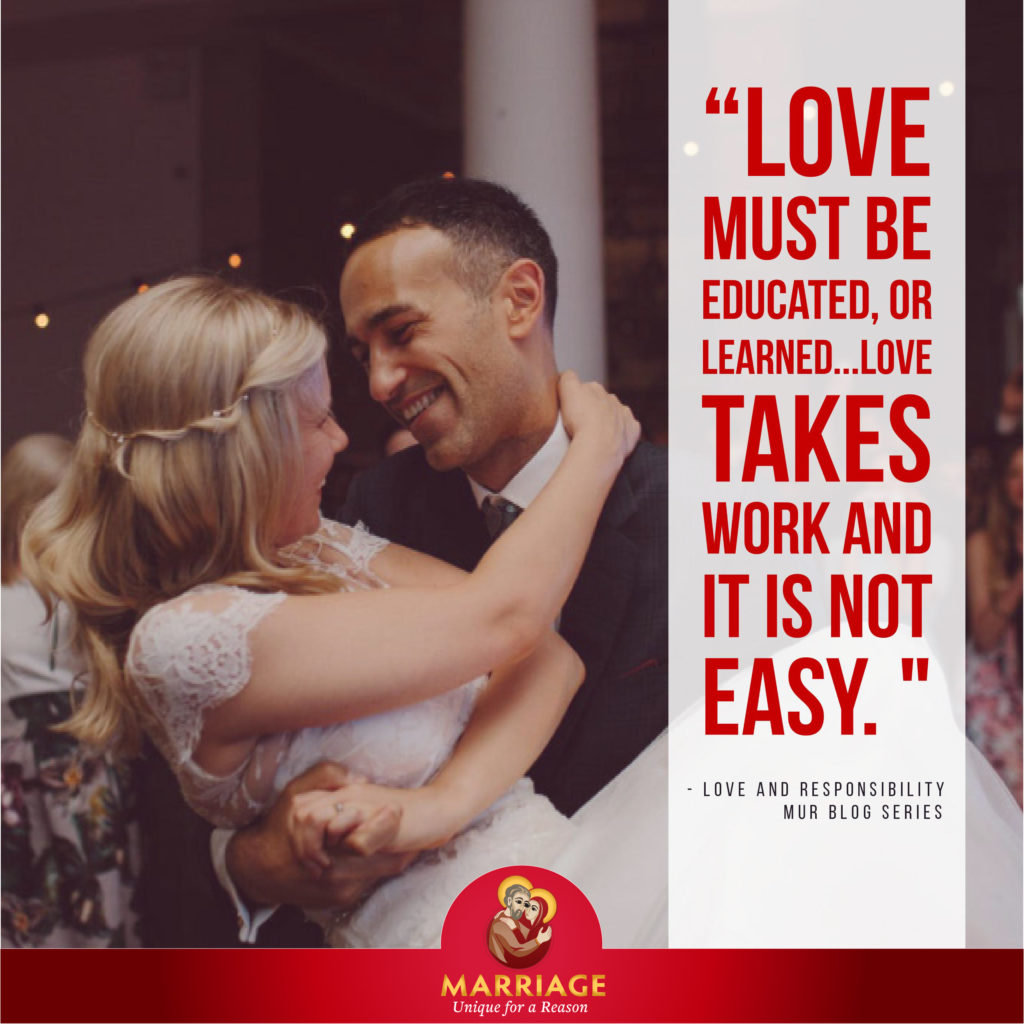 mature love on which a marriage should be based. Desire and emotion are not learned, but just happen; Mature love is learned and worked on. “For love is never something ready made, something merely ‘given’ to man and woman,” Wojtyla writes, “It is always at the same time a ‘task’ which they are set.”[1] Love is like a mission, “Should you choose to accept it” (Mission Impossible). Wojtyla writes that love is always “only ‘becoming’,”[2] not complete. The couple can never brush their hands together and declare, “Okay, now we love each other perfectly! What shall we do next?”
mature love on which a marriage should be based. Desire and emotion are not learned, but just happen; Mature love is learned and worked on. “For love is never something ready made, something merely ‘given’ to man and woman,” Wojtyla writes, “It is always at the same time a ‘task’ which they are set.”[1] Love is like a mission, “Should you choose to accept it” (Mission Impossible). Wojtyla writes that love is always “only ‘becoming’,”[2] not complete. The couple can never brush their hands together and declare, “Okay, now we love each other perfectly! What shall we do next?”
Creators of Love:
Man and woman must continually be creators of their love. They may be given, by God, their past experience, and their natural inclinations, the raw material of attraction or infatuation, but they must make their love by choosing it, over and 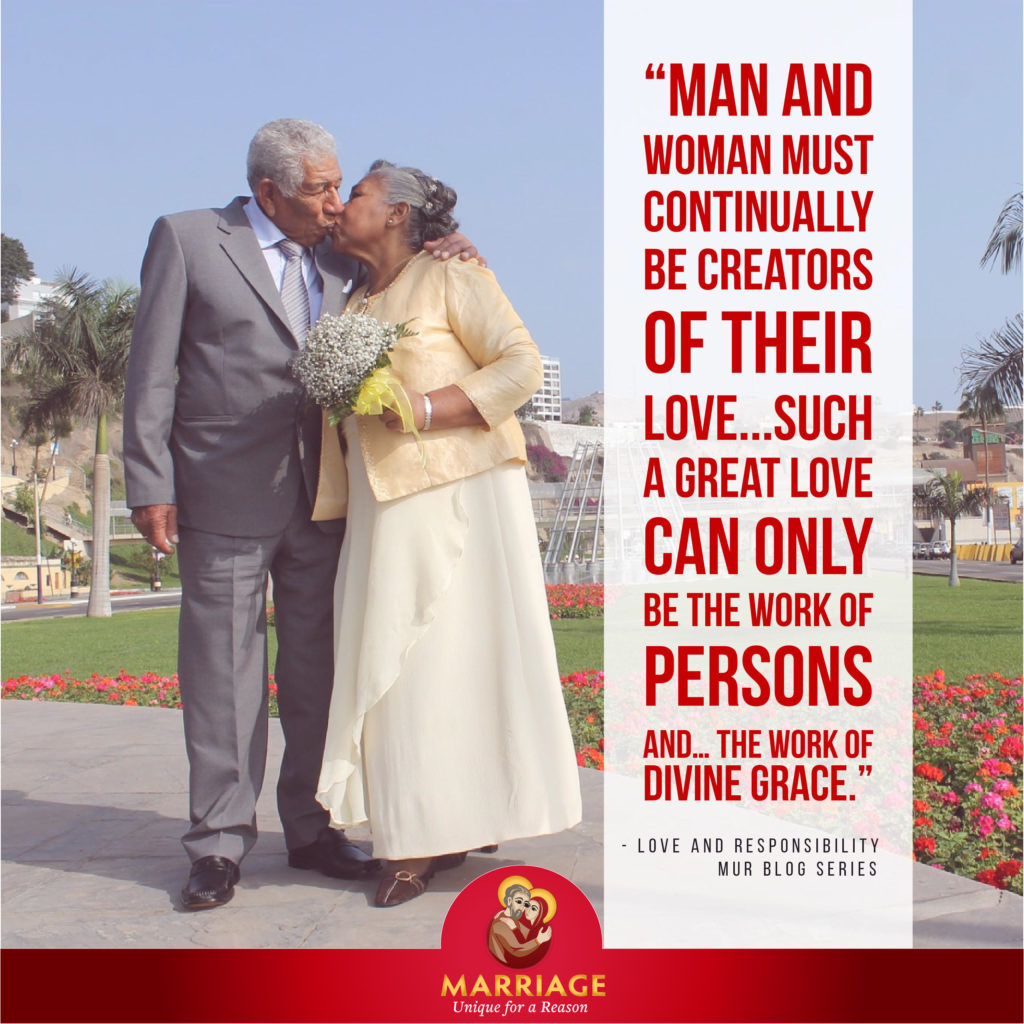 over. Love takes work and it is not easy. “Such a great love can only be the work of persons and… the work of Divine Grace.”[3] Wojtyla notes that sometimes love “follows tortuous ways,” but, “Grace has the power to make straight the paths of human love.”[4] This is the hope that couples can cling to in difficult times. God is with them.
over. Love takes work and it is not easy. “Such a great love can only be the work of persons and… the work of Divine Grace.”[3] Wojtyla notes that sometimes love “follows tortuous ways,” but, “Grace has the power to make straight the paths of human love.”[4] This is the hope that couples can cling to in difficult times. God is with them.
Wojtyla concludes his “Ethical Analysis of Love” here by noting that there is, in the relationship and man and woman, “an insidious possibility of disintegration”[5] (i.e. separation of the desires and emotions from the real choice of the person) which must be countered by developing the virtue of chastity. This is the topic of the next chapter. 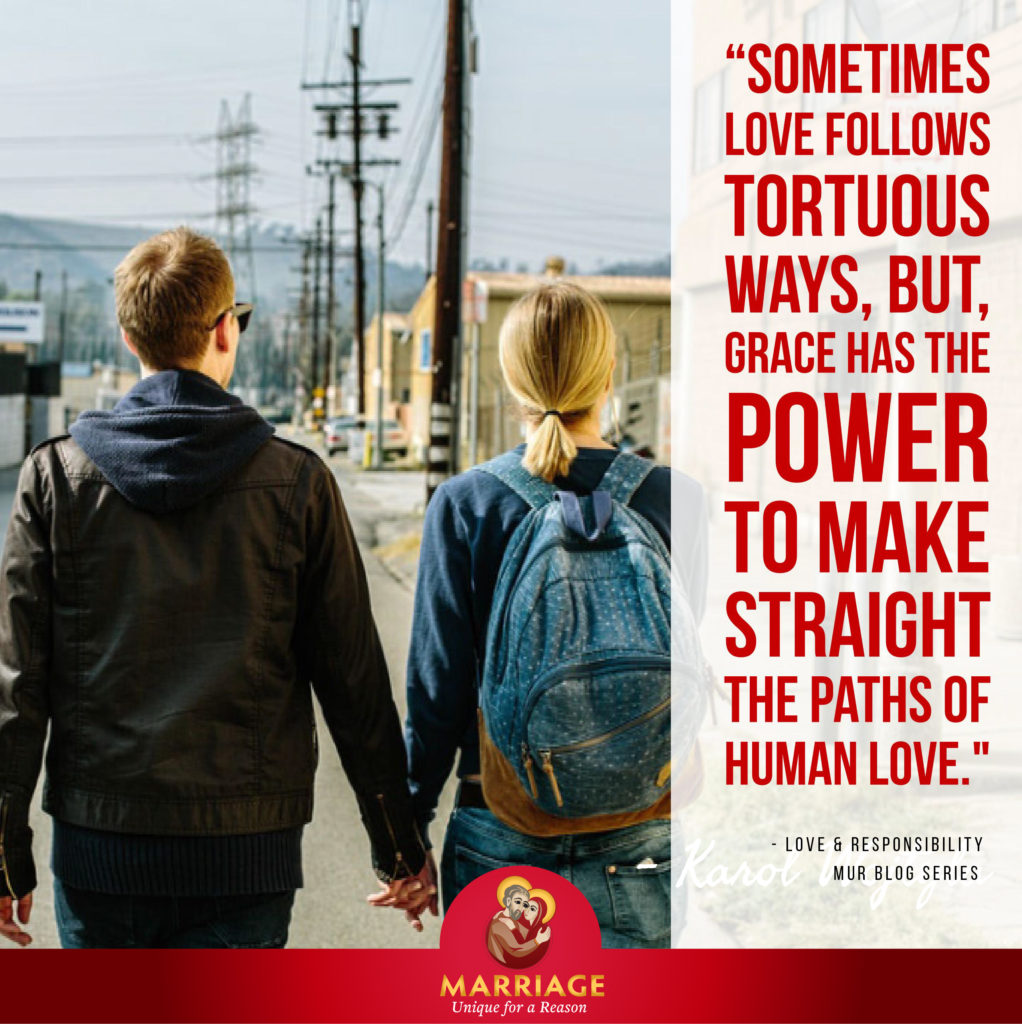
[1] Wojtyla, Karol. Love and Responsibility (San Francisco: Ignatius Press, 1993), p. 139.
[2] Ibid, p. 139.
[3] Ibid, p. 140.
[4] Ibid, p. 140.
[5] Ibid, p. 140.
Archive
Commitment: Love and Responsibility Series (Post #15)
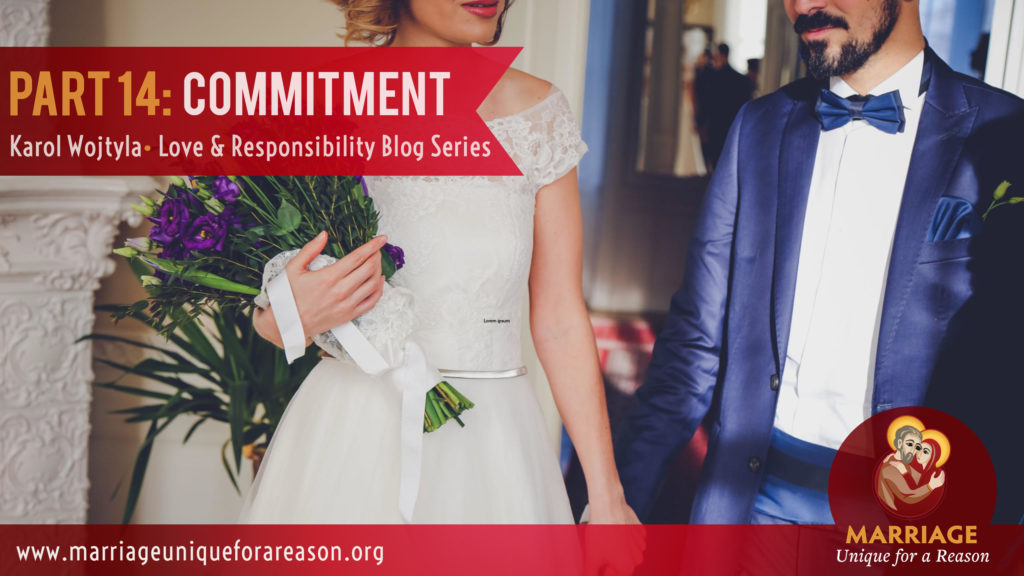
True knowledge for True Love
“Only true knowledge of a person makes it possible to commit one’s freedom to him or her,”[i] Wojtyla writes at the beginning of this section of Love and Responsibility. While giving up or limiting one’s freedom sounds unpleasant (especially to American ears), Wojtyla notes that, “Freedom exists for the sake of love.”[ii] In fact, human beings want to use their freedom to love—and not just to love for a little while but to love in a permanent, irrevocable way. “Forever” is implicit in “I love you,” not something added on. If someone said, “I love you today, but I’m not sure about tomorrow,” the other person would rightly respond, “Then you don’t love me at all.”
Wojtyla notes that the choice of loving another person—keeping in mind that love is the affirmation of the person—must be free. It cannot be made out of coercion or even passion. Wojtyla says that a person’s will “is usually the arena for a struggle  between the sexual instinct and the need for freedom.”[iii] Someone may have to conciously struggle against their bodily desires and emotions in order to see the other person clearly and to treat them as a person, not an object. “Willed love expresses itself above all in the desire of what is good for the beloved person,”[iv] Wojtyla writes.
between the sexual instinct and the need for freedom.”[iii] Someone may have to conciously struggle against their bodily desires and emotions in order to see the other person clearly and to treat them as a person, not an object. “Willed love expresses itself above all in the desire of what is good for the beloved person,”[iv] Wojtyla writes.
Focused on Oneself vs. Focused on the Other
While sexual desire and infatuation, even though they involve another person, are focused on oneself, the will can focus on the other. One can can desire happiness for the other in an unselfish way—and not just momentary happiness but the ultimate happiness of heaven. “[Love in the will] desires the absolute good, the unlimited good, happiness for that person, and in this way compensates and atones for the desire to have that other person, a person of the other sex, for itself.”[v] Rather than denying that the body and emotions are driving someone toward relationships with the other person, the will acknowledges it and seeks to shape and form what is happening into mature love.
Sexual desire and emotional infatuation want to take; love wants to give. This is the “divine aspect of love,”[vi] the fact that to love someone, “is really to desire God for that person.”[vii] In your relationships, can you say that you desire God for 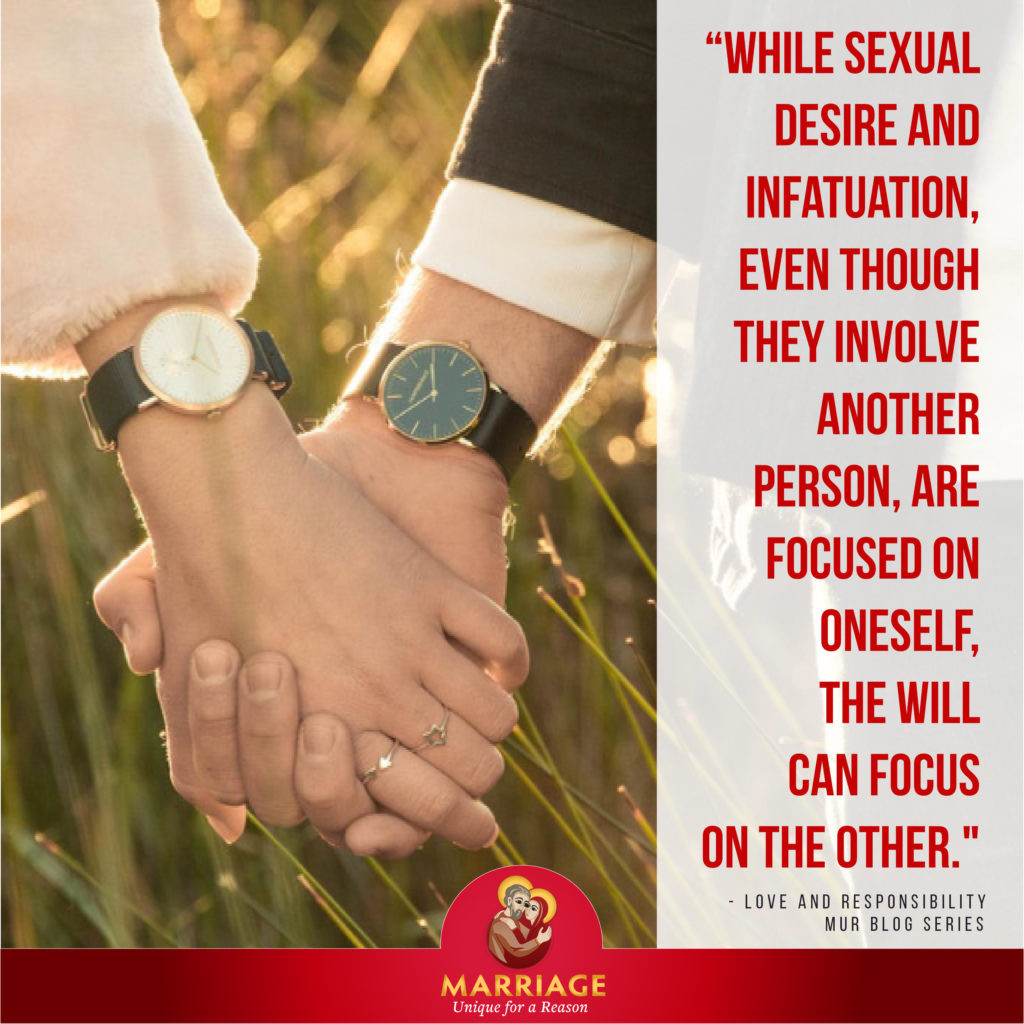 the other person? Wojtyla notes that “only people of profound faith”[viii] see this truth. Wojtyla notes that it is sometimes a great discovery when a person realizes that he can put another person first, freely and joyfully. A person who loves may sacrifice much without thinking too much about it. Think of parents who constantly put their children’s needs before their own. “Love is indeed the highest of moral values. but one must know how to transfer it to the ordinary affairs of everyday life. This is where the problem of educating love arises.”[ix] This ability to love in action shows a person’s capacity for greatness, but this greatness is often manifested in small gestures of tenderness or sacrifice: getting up before one’s spouse to start the coffee, complimenting him or her, etc. Marriage means doing “small things with great love” (as St. [Mother] Teresa of Calcutta would say).
the other person? Wojtyla notes that “only people of profound faith”[viii] see this truth. Wojtyla notes that it is sometimes a great discovery when a person realizes that he can put another person first, freely and joyfully. A person who loves may sacrifice much without thinking too much about it. Think of parents who constantly put their children’s needs before their own. “Love is indeed the highest of moral values. but one must know how to transfer it to the ordinary affairs of everyday life. This is where the problem of educating love arises.”[ix] This ability to love in action shows a person’s capacity for greatness, but this greatness is often manifested in small gestures of tenderness or sacrifice: getting up before one’s spouse to start the coffee, complimenting him or her, etc. Marriage means doing “small things with great love” (as St. [Mother] Teresa of Calcutta would say).
[i] Wojtyla, Karol. Love and Responsibility (San Francisco: Ignatius Press, 1993), p. 135.
[ii] Ibid, p. 135.
[iii] Ibid, p. 136.
[iv] Ibid, p. 137.
[v] Ibid, p. 137.
[vi] Ibid, p. 138.
[vii] Ibid, p. 138.
[viii] Ibid, p. 138.
[ix] Ibid, p. 139.
Archive
Affirmation: Love and Responsibility Series (Post #13)
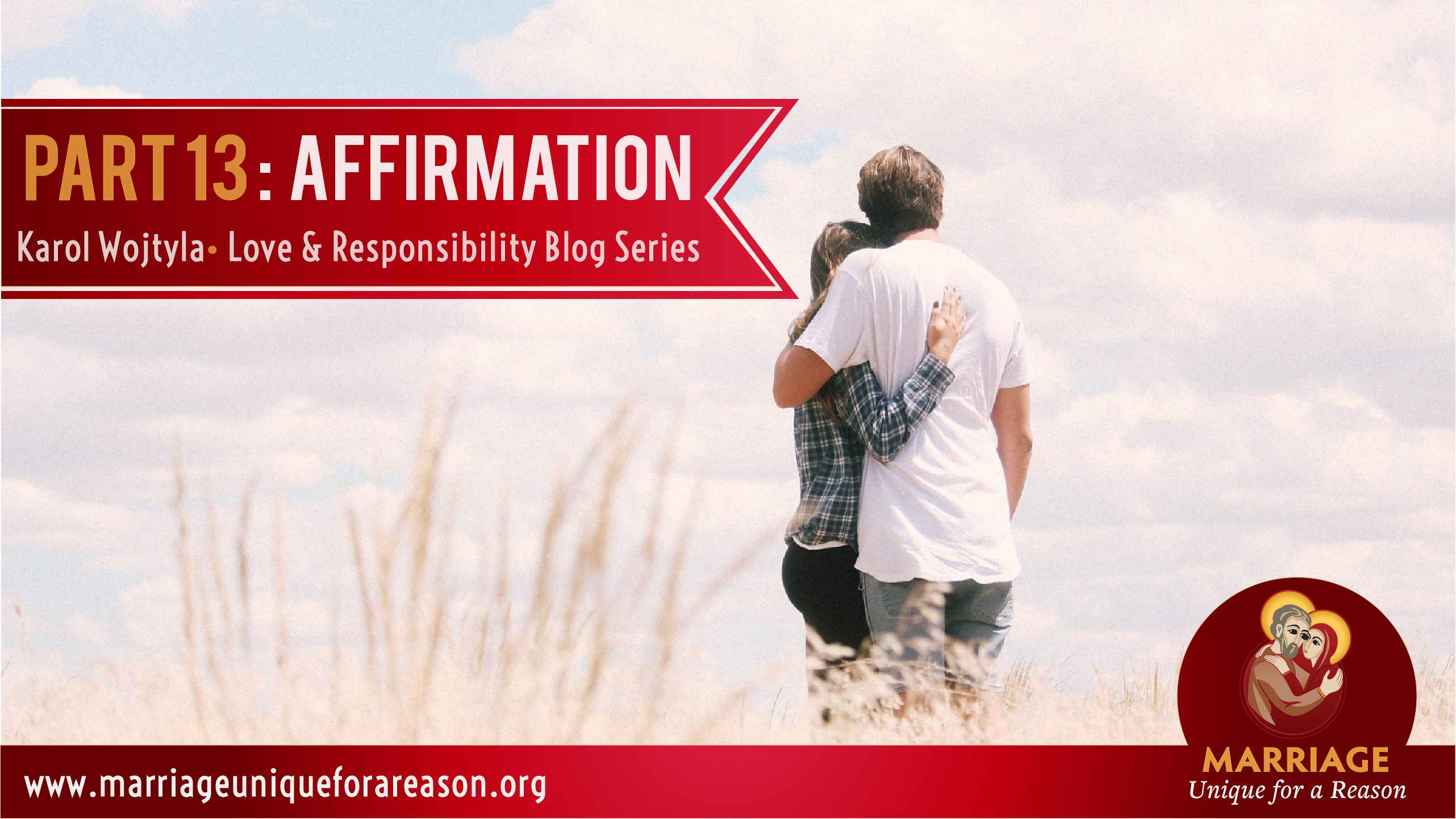
The Inherent Value of the Human Person
Karol Wojtyla reminds us in this section of Love and Responsibility that a person has worth beyond any other created thing or object in the world. A person has an inner life (spirit) and is capable of spiritual perfection (in heaven). The inherent value of every human person goes far beyond any quality that they may possess (such as beauty, brains, or brawn). [This is one reason that racism is clearly an evil, since it reduces the value of the person due to an accidental[i] quality.] The human person has unique dignity because he or she is made in God’s image and called to communion with him. 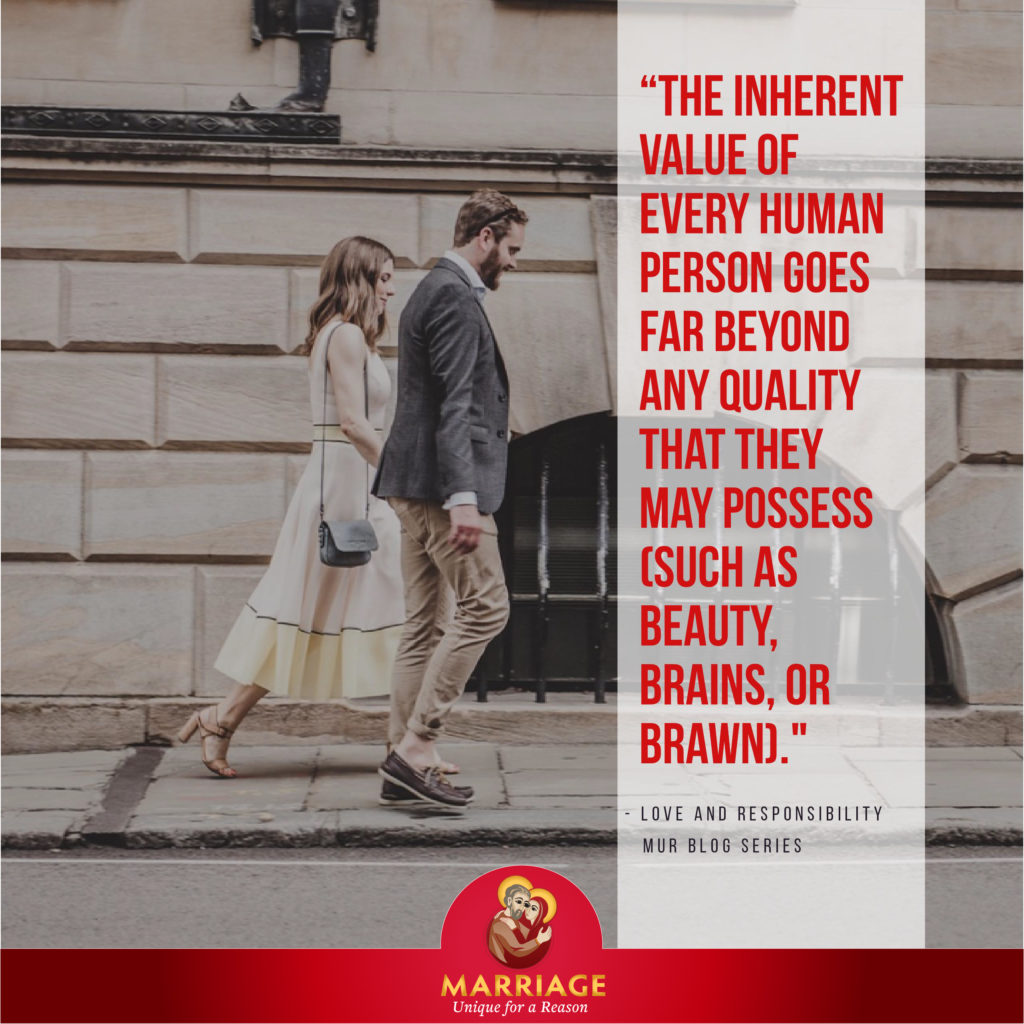
“That being so,” Wojtyla writes, “every person of the opposite sex possesses value in the first place as a person, and only secondarily possesses a sexual value.”[ii] Everyone is a person first, man or woman second. Experientially, when a man meets a woman, he typically sees her as a woman (and vice versa, when a woman meets a man, he registers as “male”) but the fact that the other is a person, “demands that the sensual and emotional reaction to a ‘human being of the other sex’ be somehow adjusted to the knowledge that the human being concerned is a person.”[iii] Harry isn’t just some kind of incarnation of maleness, and Sally isn’t just some beautiful piece of art to gaze at; they are persons whom God loves.
The Affirmation of the Person
Love must be an affirmation of the person, per Wojtyla; It is a declaration of the person’s worth and dignity. It says of and to the person: “It is good that you exist.” This love is a virtue, an “authentic commitment of the free will of one person… resulting from the truth about another person.”[iv] Affirmation of the person is connected with the other aspects of love (sensuality, emotion) but not reducible to them. The full truth of the person—with his or her faults and weaknesses as well as virtues and gifts—must be seen and accepted by the one who truly loves. 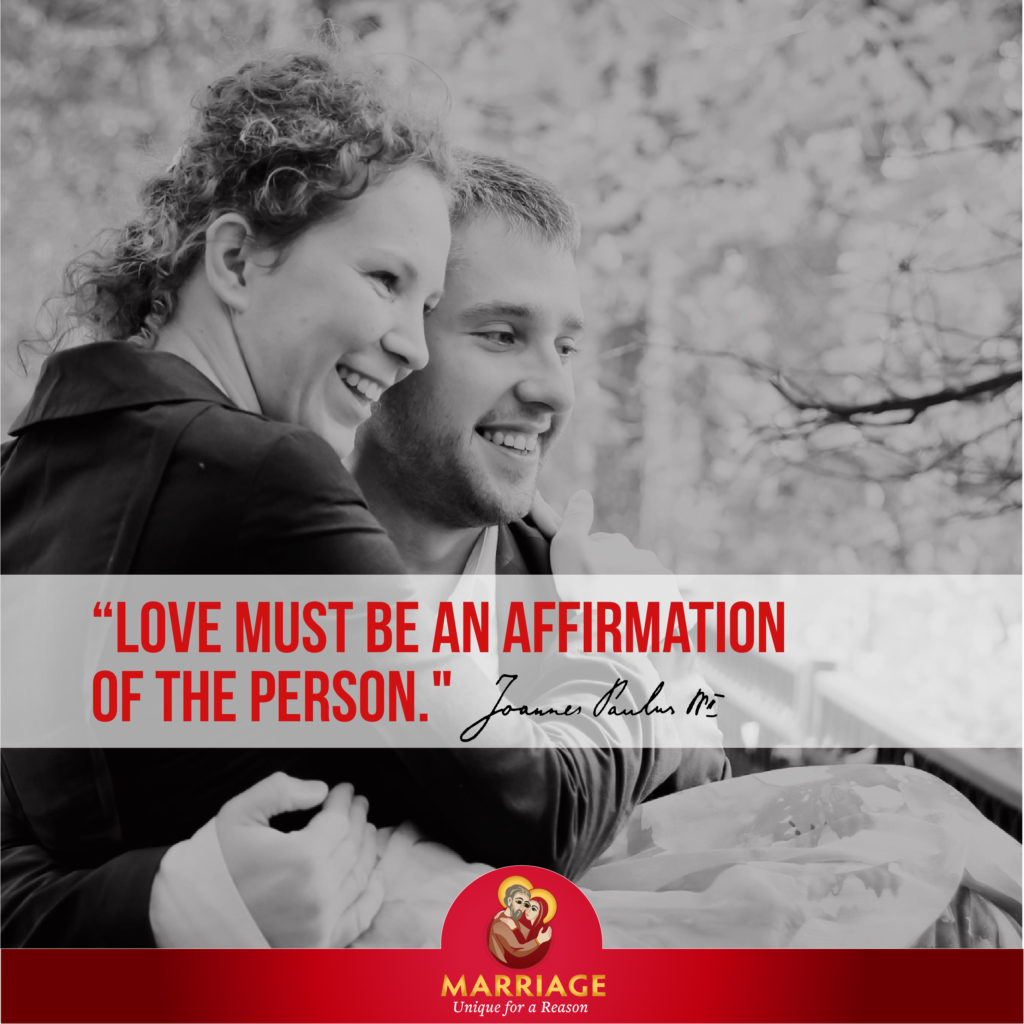
Learning this virtue of charity/love by focusing on affirming the person leads to two other developments in a person’s life. One is growth in the virtue of chastity, exhibiting self-control over one’s sensual and emotional reactions. Second is the discernment of one’s vocation or state in life (marriage or celibacy for the Kingdom). Both states in life are based on the call to love—to affirm every person—in a particular way.
In the next section, Wojtyla continues contemplating the necessity of marital love to be both subjective and objective, repeating much of what has been said before. He talks of what it takes for two people to belong to one another in love. A point he reiterates from earlier is the necessity of each person to know their own worth and dignity as a person before entering a relationship. “A woman is capable of truly making a gift of herself only if she fully believes in the value of her person and in the value as a person of the man to whom she gives herself.”[v] This can be assumed to be reciprocal. One of the challenges of love between a man and a woman is each internalizing that he or she is worthy of it.
[i] Please note the use of the term “accidental” in its philosophical meaning as un-essential, or not determinative of the thing’s nature. For example, for a cat, having long fur is an “accident” while being a creature with four paws and a superiority complex is essential.
[ii] Wojtyla, Karol. Love and Responsibility (San Francisco: Ignatius Press, 1993), p. 122.
[iii] Ibid, p. 123, emphasis original.
[iv] Ibid, p. 123.
[v] Ibid, p. 129.
Archive
Ethics: Love and Responsibility (Post #12)
 To begin his formal ethical analysis of love in Love and Responsibility, Karol Wojtyla sets out two fundamental ways through which to consider ethics: experience or virtue.
To begin his formal ethical analysis of love in Love and Responsibility, Karol Wojtyla sets out two fundamental ways through which to consider ethics: experience or virtue.
Ethics of Experience:
Wojtyla starts with the use of experience as a guideline for ethics. Situationalism (or relativism) sees every situation as unique in such a way that there can be no objective rules about behavior. What is right or wrong in a given situation just 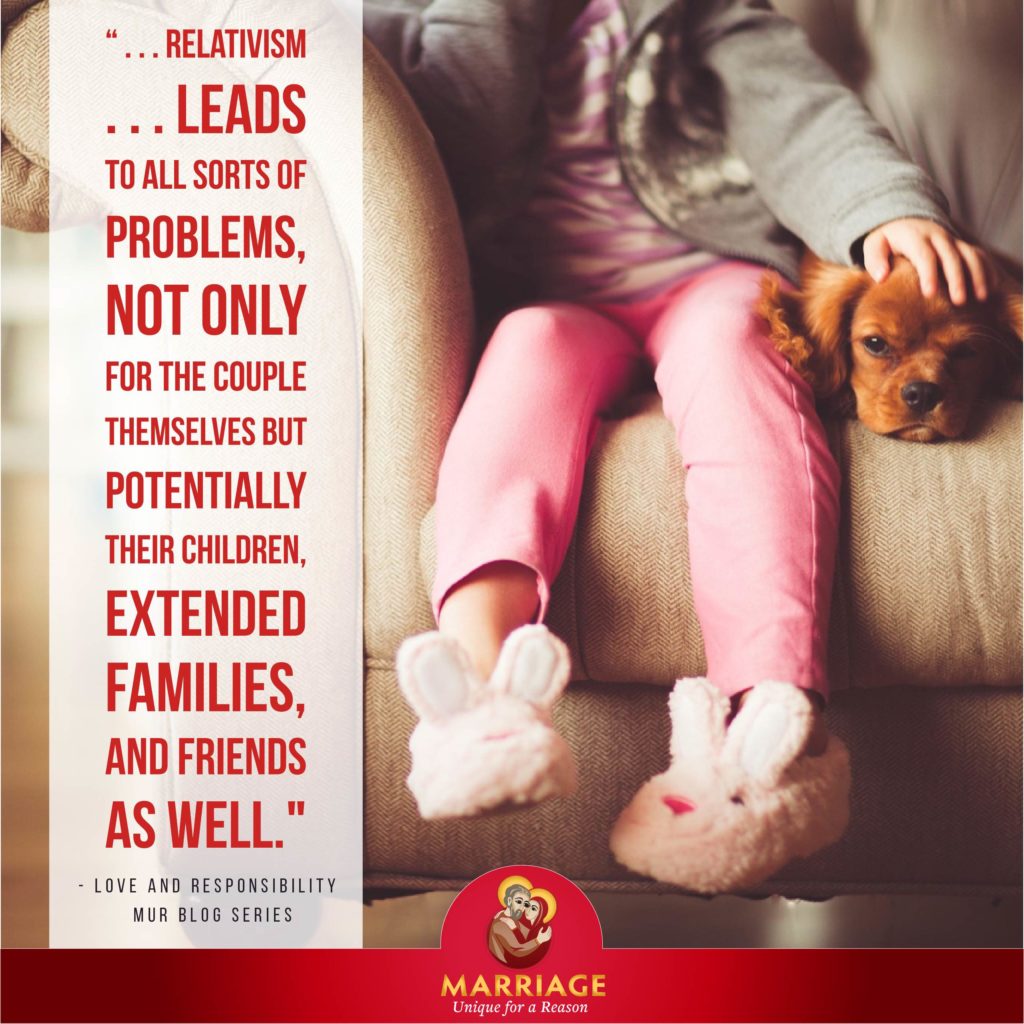 depends on the situation and the people in it. The people themselves are the only ones who can know (or say) what is good for them. So when it comes to the relationship between a man and a woman, anything goes as long as it “works” for the couple. Hopefully, it is obvious that this kind of ethical system leads to all sorts of problems, not only for the couple themselves but potentially their children, extended families, and friends as well.
depends on the situation and the people in it. The people themselves are the only ones who can know (or say) what is good for them. So when it comes to the relationship between a man and a woman, anything goes as long as it “works” for the couple. Hopefully, it is obvious that this kind of ethical system leads to all sorts of problems, not only for the couple themselves but potentially their children, extended families, and friends as well.
Ethics of Virtue:
In contrast, according to the ethics of virtue, it is a person’s duty to choose what is good. What is good is not decided by the person himself but rather determined by some objective rule or norm. “For the freedom of the human will is most fully displayed in morality through duty,”[1] Wojtyla writes. A duty is discovered, not created, through applying a norm. For Wojtyla, the personalistic norm (i.e. the command to love) furnishes the “should’s” and “should not’s” of the relationship between man and woman. Whatever is done should be done out of love, not lust or emotional manipulation. 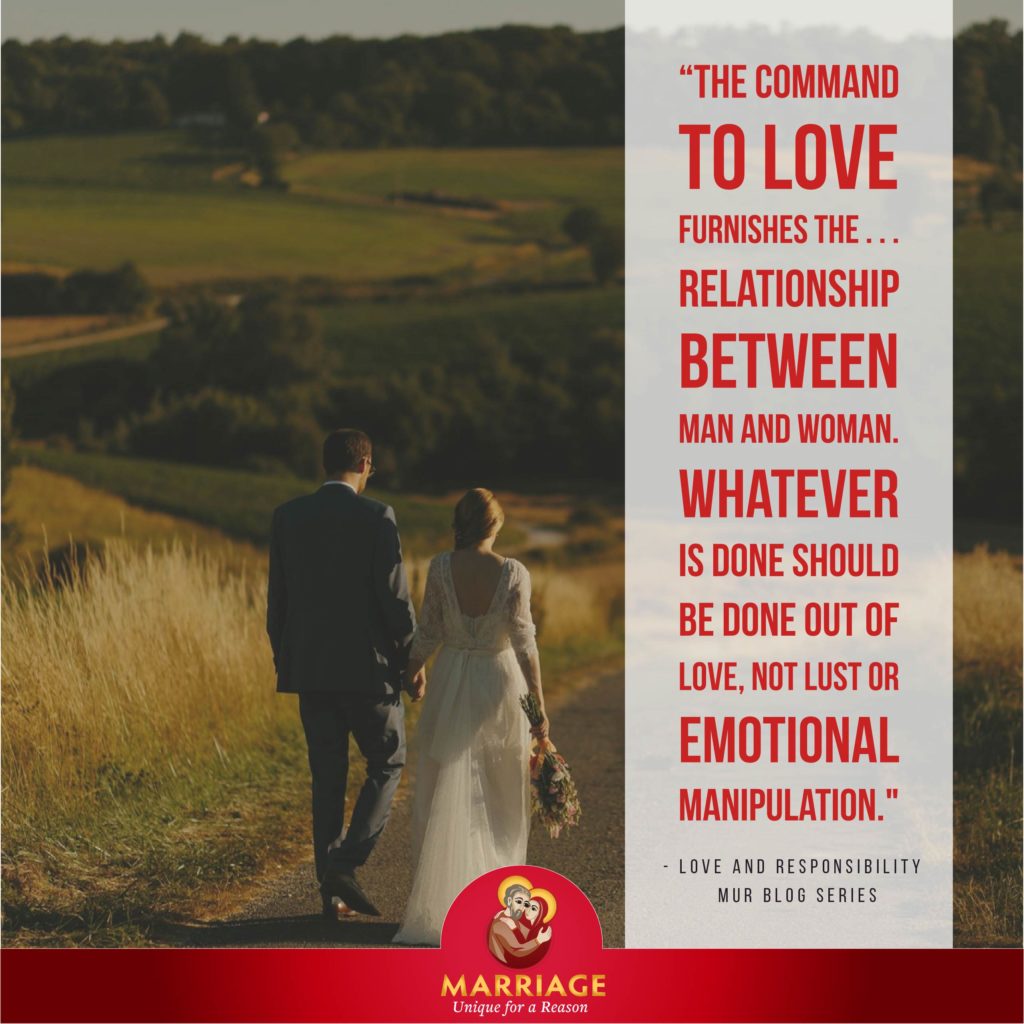 Wojtyla argues that without ethical completeness (respect, love for the other over oneself, etc.), there is no psychological completeness to love either. In other words, if love as a virtue is not present in the relationship between a man and a woman, it will not even be psychologically satisfying in the end because it is not authentic love.
Wojtyla argues that without ethical completeness (respect, love for the other over oneself, etc.), there is no psychological completeness to love either. In other words, if love as a virtue is not present in the relationship between a man and a woman, it will not even be psychologically satisfying in the end because it is not authentic love.
Consider these two approaches to ethics as if they were applied to eating. Situationalism would say that whatever you eat is fine, if you think it is. Doughnuts every day? Go for it! Only you can know if that is a good breakfast for you. Virtue, on the other hand, requires you to consider the objective nutritional value of the food and act accordingly. That doesn’t mean that you always make the right decision, but that you know there is a right to strive for.
So how do a man and woman grow in the Christian virtue of love/charity? Stay tuned!
Click the link below to read ALL of MUR’s Love and Responsibility blog series: https://goo.gl/6itvJH
[1] Wojtyla, Karol. Love and Responsibility (San Francisco: Ignatius Press, 1993), p. 120.
Archive
Marital Love: Love and Responsibility Series (Post #8)
Betrothed Love:
In this section of Love and Responsibility, Wojtyla looks specifically at the type of love that a husband and wife share, and he calls this “betrothed love.” The phrase in English that better conveys what Wojtyla means is “marital love,” since he means the love in which a man and woman give themselves fully to one another.
Wojtyla reminds us that we must possess ourselves before we can give ourselves. Self-gift is not about passively becoming what someone else wants us to be. Have you seen the movie 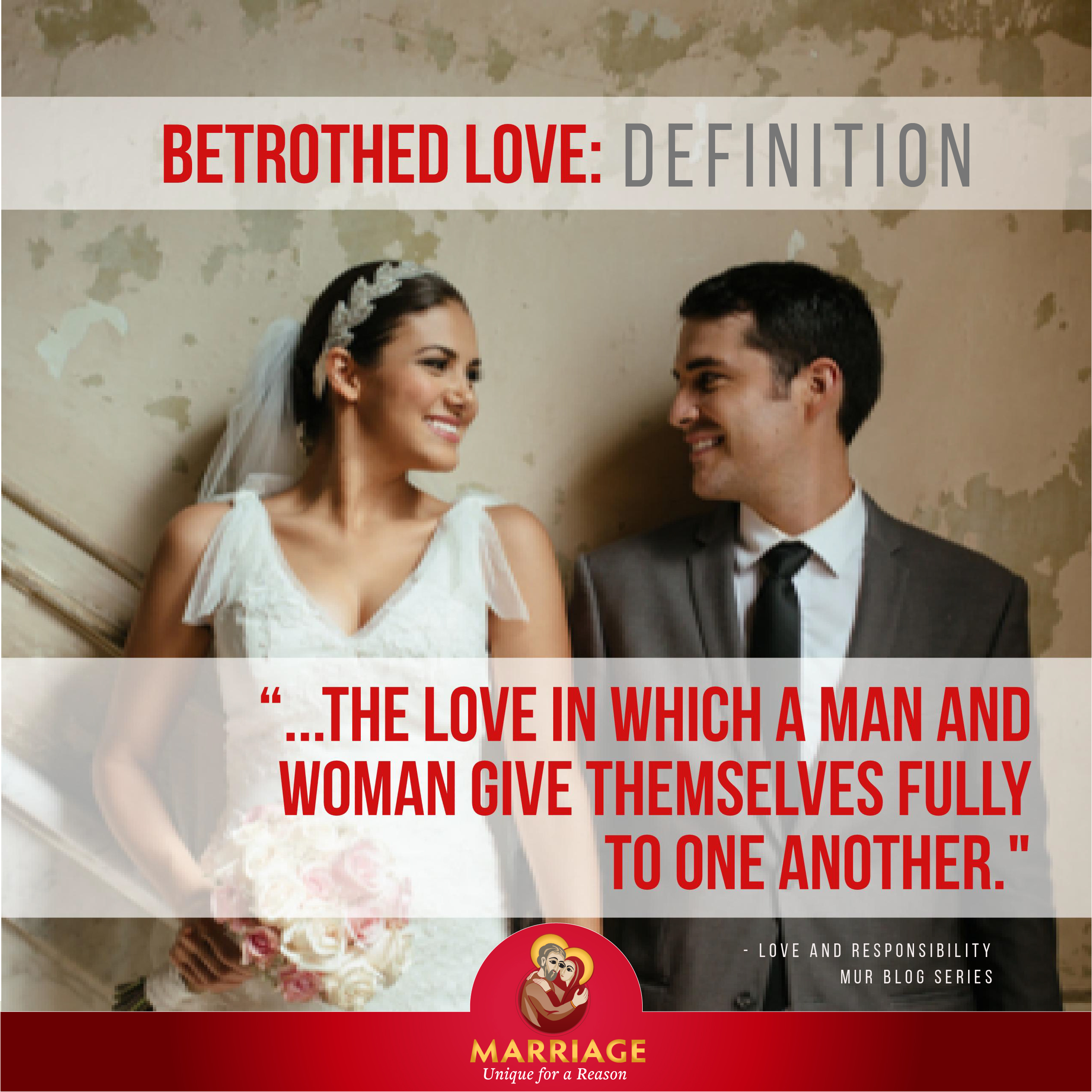 Runaway Bride (1999)? The main character (Maggie) always adjusted her likes and dislikes according to what her boyfriend or fiancé liked. She wanted to be loved, so she changed herself to match whatever the man she was with liked in a woman. With the hippie, she became a hippie; with the athletic guy, she became a sports fan. After this habit was pointed out to her, Maggie realized that she didn’t know herself.
Runaway Bride (1999)? The main character (Maggie) always adjusted her likes and dislikes according to what her boyfriend or fiancé liked. She wanted to be loved, so she changed herself to match whatever the man she was with liked in a woman. With the hippie, she became a hippie; with the athletic guy, she became a sports fan. After this habit was pointed out to her, Maggie realized that she didn’t know herself.
Most of us can probably relate to this impulse at some level: We fudge our favorite book so that we sound smart, or nod our head when our crush talks about a band we’ve never heard of… if that kind of thing becomes a habit, we might reach a point where we don’t “possess” ourselves and cannot find real love. This is perhaps more common for women than men.
Marriage is to Give
Wojtyla points out that, psychologically speaking, it is usually the woman who feels that her role in marriage is to give. However, objectively (or ontologically) speaking, both spouses must give themselves to one another, and not just sexually. “Giving oneself only sexually, without the full gift of the person,”[1] is just a form of use, as previously discussed. Husband and wife give themselves to one another even through the mundane activities of daily life. 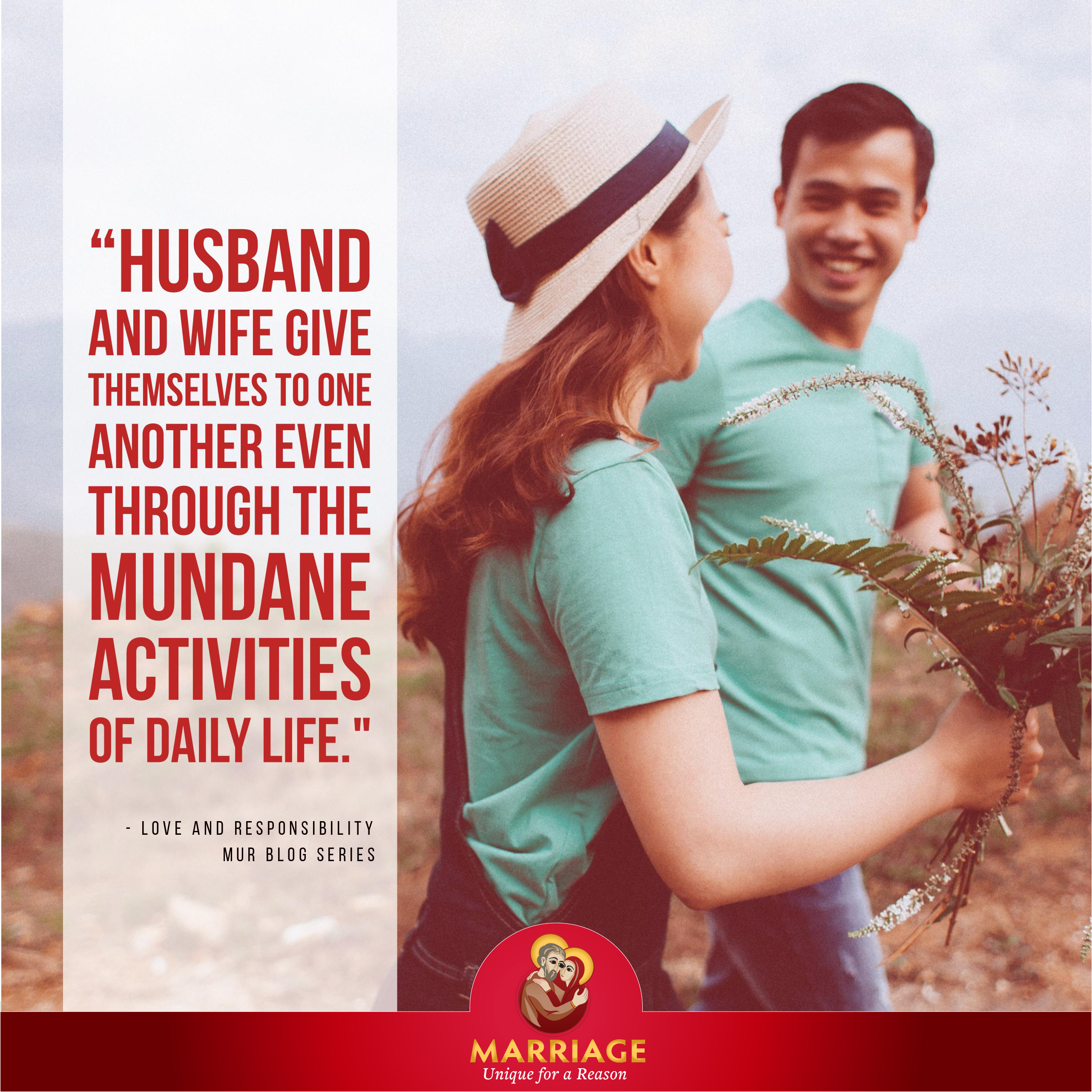
At the risk of being too movie-heavy in this post, the movie Fireproof (2008), while one of the cheesiest movies ever, does a great job communicating this truth about marriage. Once the husband (Caleb) begins really giving himself to his wife by making her coffee, buying her flowers, and considering her needs before his own (possibly for the first time in their entire marriage), the relationship is transformed. Caleb comes to understand that love is a choice; He recognizes that he has been selfish and that he has not acted with goodwill and friendship.
The Person and Love:
Wojtyla concludes with the note that marital love is not some isolated kind of love, different from every other kind. “Betrothed love, though of its nature it differs from all the forms of love previously analyzed, can nevertheless not develop in isolation from 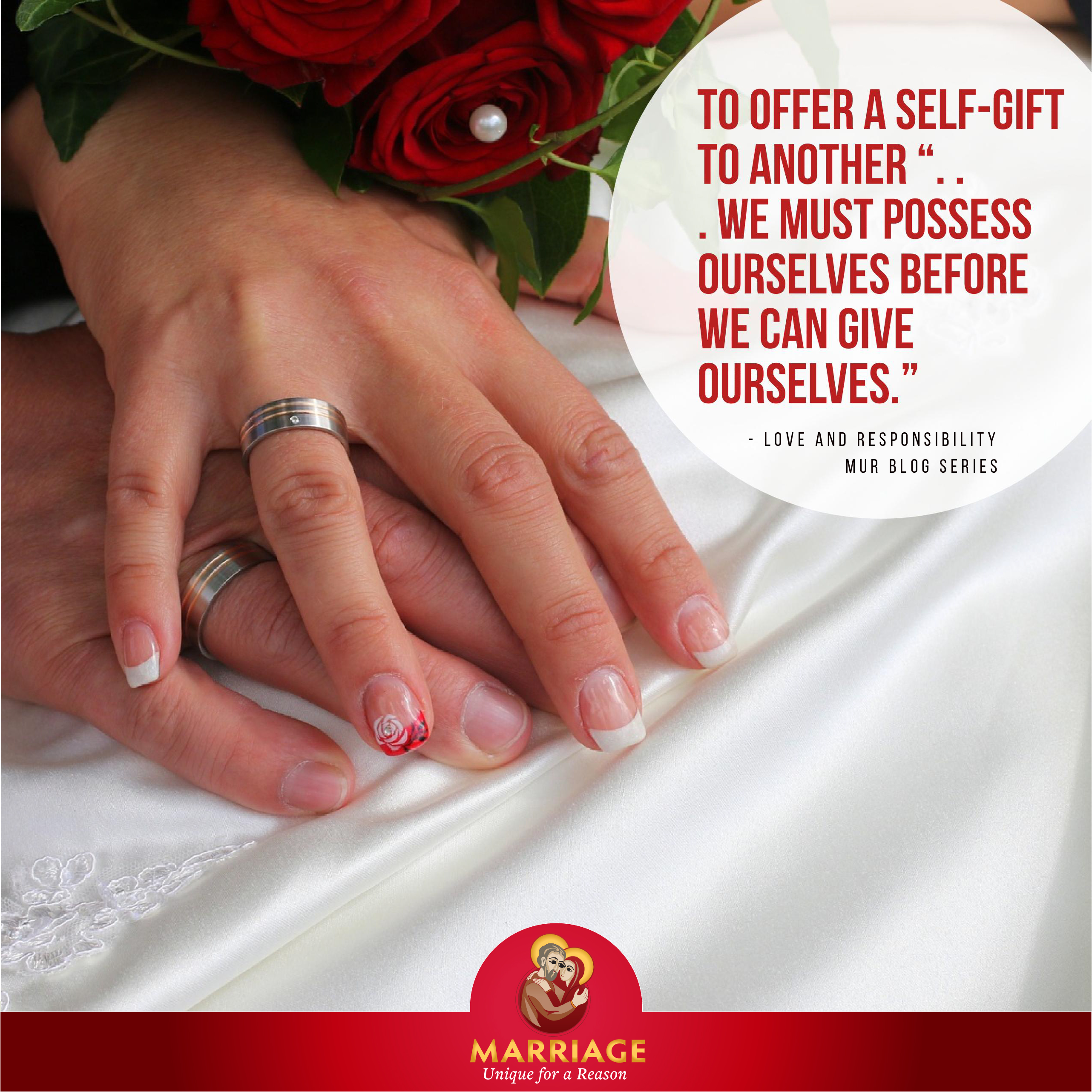 them. In particular, it is essential that Husband and wife give themselves to one another even through the mundane activities of daily life..”[2]
them. In particular, it is essential that Husband and wife give themselves to one another even through the mundane activities of daily life..”[2]
Thus concludes the section on “The Person and Love.” We have looked at attraction, desire, goodwill, reciprocity, friendship, and betrothed love as experiences of the person. In the next section, Wojtyla goes into a psychological analysis of love. Stay tuned!
[1] Ibid, p. 99.
[2] Ibid, p. 100.
Archive
AL Bootcamp: Final 3 Days!
June 6
“Love endures all things” (1 Cor 13:7).
Pope Francis: “In family life, we need to cultivate that strength of love which can help us fight every evil threatening it” (Amoris Laetitia, no. 119).
What is an evil that is threatening your family today? This may be from within (resentment, exhaustion, sin) or without (technology, entertainment, financial hardship). How are you fighting it?
June 7
“Love endures all things” (1 Cor 13:7).
Pope Francis: “I am sometimes amazed to see men or women who have had to separate from their spouse for their own protection, yet, because of their enduring conjugal love, still try to help them, even by enlisting others, in their moments of illness, suffering or trial. Here too we see a love that never gives up” (Amoris Laetitia, no. 119).
Do you know anyone in the situation that Pope Francis mentions here? Reach out to give that family a hand. If you do not know anyone personally, consider a donation to a domestic violence ministry.
June 8
“Love never fails” (1 Cor 13:8).
This is the conclusion of the AL Challenge. Did you make it through? Share your stories via Facebook.
Archive
Friday Fast: April 11
Intention: We pray for a deeper understanding of what it means to be created male or female.
Reflection: During a recent morning meditation, Pope Francis reflected on the Book of Genesis. “The creation of man and woman is the masterpiece of creation,” the Pope explained. God “did not want for man to be alone: he wanted him to be with his companion, his companion on the journey.”
Here the Bible shows us a very important truth; man and woman are equal, but different. This sexual difference is actually complementary. It is through the existence of woman that we are able to fully appreciate the uniqueness of man and vice versa. An example of this aspect of difference and complementarity can be seen in beautiful paintings where two complementary colors are used. When brought together, the two different colors look more vibrant and unique than they would have looked separately. The same can be said of man and woman. In the words of Blessed John Paul II, “femininity in some way finds itself before masculinity, while masculinity confirms itself through femininity.”
Did You Know? In his Theology of the Body, Blessed John Paul II explained that “man became an image of God not only through his own humanity, but also through the communion of persons, which man and woman form from the very beginning.” Through marriage, a husband and wife are able to be a true communion of persons by giving themselves and receiving the other in unselfish love. In this way, a husband and wife have the unique ability to reflect Trinitarian Love.
Archive
Virginia Bishops File Amicus Brief to Defend Marriage, Commonwealth’s Constitution
 The Bishops of Virginia, represented by the Virginia Catholic Conference, filed an amicus curiae brief today with the U.S. Court of Appeals for the Fourth Circuit. In January, District Court Judge Arenda Wright Allen struck down the provision in Virginia’s constitution that affirms marriage as the union of one man and one woman. The brief filed on behalf of the Virginia Catholic Conference explains, “Virginia’s interest in marriage is based in the Commonwealth’s foresight that changing the legal definition of marriage would unavoidably change the way Virginia’s citizens view marriage and make the Commonwealth’s marriage laws adult-focused rather than child-focused. If the message and function of marriage is changed in concept, the cultural significance attached to marriage will also change.”
The Bishops of Virginia, represented by the Virginia Catholic Conference, filed an amicus curiae brief today with the U.S. Court of Appeals for the Fourth Circuit. In January, District Court Judge Arenda Wright Allen struck down the provision in Virginia’s constitution that affirms marriage as the union of one man and one woman. The brief filed on behalf of the Virginia Catholic Conference explains, “Virginia’s interest in marriage is based in the Commonwealth’s foresight that changing the legal definition of marriage would unavoidably change the way Virginia’s citizens view marriage and make the Commonwealth’s marriage laws adult-focused rather than child-focused. If the message and function of marriage is changed in concept, the cultural significance attached to marriage will also change.”
Archbishop Salvatore Cordileone of San Francisco, chairman of the U.S. Conference of Catholic Bishops’ Subcommittee for the Promotion and Defense of Marriage voiced his support of the legal action. “The Bishops of the Catholic Church in the United States are united in their desire to preserve the institution of marriage, and we support the Virginia bishops in their effort to defend Virginia’s recognition of marriage as the union of one man and one woman. For the good of children, it is critical that society preserve the true meaning of marriage.”
With the Virginia Catholic Conference, the U.S. Conference of Catholic Bishops (USCCB) also filed an amicus brief in Bostic v. Schaefer, along with four other institutions. Oral arguments in this case were heard on May 13, 2014. The audio is available at the United States Court of Appeals for the Fourth Circuit.
Click here for the full press release. The amicus brief can be found at www.vacatholic.org.
Updated Monday, May 19, 2014
Archive
“Marriage is the icon of God’s love for us”
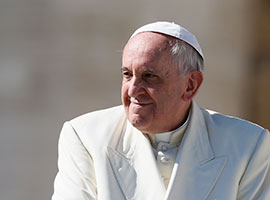 Today, Pope Francis concluded his Wednesday catechesis on the Sacraments with a reflection on marriage. He began by explaining that marriage is “A sacrament that leads us to the heart of God’s plan, which is a plan of alliance with his People, with all of us, a plan of communion.” He then explained, “The image of God is a married couple, man and woman, not only man, not only woman, but rather both. This is the image of God: love, God’s alliance with us is represented in the alliance between man and woman.”
Today, Pope Francis concluded his Wednesday catechesis on the Sacraments with a reflection on marriage. He began by explaining that marriage is “A sacrament that leads us to the heart of God’s plan, which is a plan of alliance with his People, with all of us, a plan of communion.” He then explained, “The image of God is a married couple, man and woman, not only man, not only woman, but rather both. This is the image of God: love, God’s alliance with us is represented in the alliance between man and woman.”
“We were created to love, as a reflection of God and his love. And in matrimonial union the man and woman realize this vocation, as a sign of reciprocity and the full and definitive communion of life.” When a man and a woman receive the Sacrament of marriage, “God is, so to say, ‘mirrored’ in them, he imprints in them the features and indelible nature of His love. Marriage is the icon of God’s love for us. Indeed, God too is communion: the three Persons of the Father, the Son and the Holy Spirit have always lived and live forever in perfect unity. And this is the mystery of marriage: God makes married couples into one existence. The Bible uses a strong term: it says one ‘flesh’ only, so intimate is the union between man and woman in marriage.” Pope Francis then concluded his catechesis by saying, “Married life is beautiful, and must be protected.”
Let us pray together for the courage to continue to protect the truth of marriage as the union of one man and one woman!
Archive
“The Masterpiece of Creation”
Pope Francis recently reflected on the Gospel reading of Mark in which the Pharisees, wishing to put Jesus to the test, asked him whether it is lawful to divorce. The Pope reminded his listeners that Jesus “goes right back to the days of creation.” Jesus explains, “But from the beginning of creation, God made them male and female; ‘For this reason a man shall leave his father and mother and be joined to his wife, and the two shall become one. So they are no longer two but one flesh.’”
Pope Francis had much to say about this event and explained quite beautifully that “the Lord is here referring to the masterpiece of creation.” For God “created the light and saw that it was good.” Then “he created the animals, the trees, and the stars: all good.” But “when he created man” he said “that he was very good.” Pope Francis continued, “the creation of man and woman is the masterpiece of creation.” Also because God “did not want for man to be alone: he wanted him to be with his companion, his companion on the journey.” Pope Francis then explained that this moment was also “the beginning of love.” However, he added that “the Lord’s masterpiece was not finished there…the Lord holds up this love contained in the masterpiece of creation in order to explain the love he has for his people. Yet there is another step: when Paul needs to explain the mystery of Christ, he also does so in relation and in reference to the bride. For Christ is wedded: he wedded the Church, his people; as the Father had wedded his people Israel, so Christ espoused his people to himself.”
All of this, the Pope concluded, brings to mind the “plan of love”, “the journey of love of Christian marriage, which God blessed in the masterpiece of his creation with a blessing that can never be taken away. Not even original sin destroyed it.” And “when one considers this,” he quite naturally sees “how beautiful love is, how beautiful marriage is, how beautiful the family is, how beautiful this journey is.”
For Pope Francis’ full reflection, click here.

